#anyway he literally exist because I started viewing my younger self as a completely different person
Explore tagged Tumblr posts
Text

Lil OC art I did today.
Basically a demon who gets trapped in a girls body (effectively killing her), so now he has to deal with being a guy in a girls body, the girls killer girlfriend, his other half (demon counterpart) willingly taking over another’s body and like, having emotions for the first time!!! (being a god/demon of nothing and being impartial to literally everything doesn’t give way to lots of feels yknow?)
#bonus it come with transphobic parents and friends wooohop#not fun for him I guess#anyway he literally exist because I started viewing my younger self as a completely different person#so I liked to pretend I had forcibly been stuck in my own body…yeah#I’m fine ahaha#but he’s cool#I could ramble about him forever#and all of my ocs in this story cause he isn’t the main character#important but not my#oc#oc art#this is actually very trans and you know why#trans#transgender#art#small artist#he is called The Nothing btw
4 notes
·
View notes
Note
Hey, d'you have any French book recs? I'm trying to work on my French, and rn I have downloaded one of my favourite book series' French translations, but I figured maybe books already written in French might work better? Also have you read the Ranger's Apprentice series? 1/2
RA's def flawed - the books' narration does like to point bright arrows at the protagonists' intelligence, and the last few books def have the tone of 'old white man trying to write feminism', although at least he's trying? - and it's aimed more to the younger side of YA, but it is still a very fun series, and I can ignore the flaws fairly easily, at least partly due to nostalgia? This rather long lol but I'm wordy.
I'll start with the second question: no, although every time the series is brought up I have to check the French title and go "oh, right, I've seen these books in stores". But I've never purchased or read them. It sounds like something I probably would have enjoyed as a teen but I just missed the mark, and these days I'm trying to drown myself in queer books, so that probably isn't happening.
As for your first question, geez, I haven’t read a French book in years, so this is gonna skew middle grade/YA, though that may not be so bad if the point is to learn the language. I will also say that as a result, these may read a little outdated.
I'll put it under a cut, even if Tumblr has become really bad with correctly displaying read mores. Sorry, mobile crowd.
It's also likely that old readers of the blog will have seen me talk about most of these. I don't feel like going through old posts.
One last thing: while I was curating this list I took the time to make a Goodreads shelf to keep track of those.
The Ewilan books by Pierre Bottero
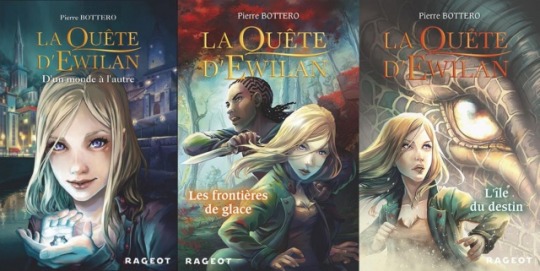
(It's a testament to how long ago I read these books that these are not the covers of the edition I own, and I can't even find those on Google. I'm settling for a more recent cover anyway since it'll make it easier to find them, presumably)
There are at least three trilogies (that I know of) set in the same world.
The first trilogy is essentially an isekai (so, French girl lands in parallel fantasy world by accident) with elements of chosen one trope, though I find the execution makes it worth the while anyway.
The second trilogy is a direct sequel, so same protagonist but new threat, and the world gets expanded.
The third one is centered around a supporting characters from the previous books, and the first couple of books in it are more her backstory than a continuation, though the third one concludes both that trilogy and advances the story of the other books as well.
Notably these books have a really fun magic system where the characters "draw" things into existence. It's just stuck with me for some reason.
A bunch of stuff by Erik L'Homme
I have read a lot of this man's books, starting with Le Livre des Etoiles.
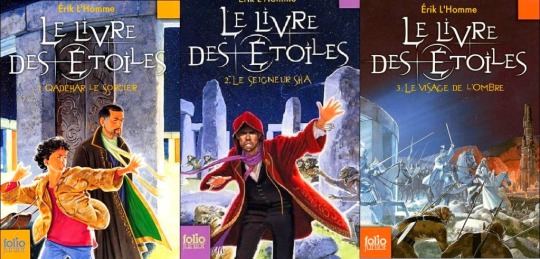
They also skew towards the young end of YA, arguably middle grade, I never bothered to figure out where to draw the line. They're coincidentally also using the premise of a parallel world to our own (and yes, connected to France again, the French are just as susceptible of writing about their homeland), but interestingly are set from the point of view of characters native to the parallel world.
It also has a very unique magic system, this one based on a mix of a runic alphabet and sort-of poetry. I'll also say specifically for these books that the characters stuck with me way more than others on this list, which is worth mentioning.
This trilogy is my favorite by Erik L'Homme, but I'll also mention Les Maîtres des brisants, which is a fantasy space opera with a pirate steampunk(?) vibe. I think it's steampunk. I could be mistaken. But it's in that vein. It's also middle grade, in my opinion not as good, but it could just be that it came out when I was older.
Another one is Phaenomen, which was a deliberate attempt at skewing older (though still YA). This one is set in our (then-)modern world and centers a group of teens who happen to have supernatural powers. I guess the best way to describe it is a superhero thriller? If you take "superhero" in the sense of "people with individualized powers", since they don't really do a lot of heroing.
...I really need to brush up on genre terminology, don't I.
The Ji series by Pierre Grimbert
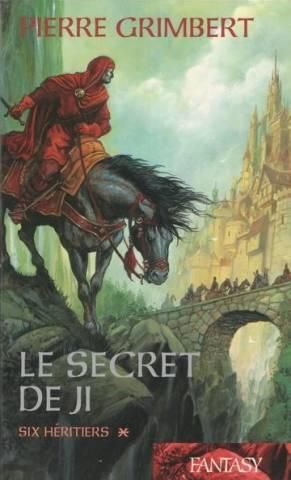
This one is actually adult fantasy, though it definitely falls under "probably outdated". It is very straight, for starters, and I'd have to give it another read to give a more critical reading of how it handles race (it attempts to do it, and is well meaning, but I'm not sure it survives the test of time & scrutiny, basically).
If I haven't lost you already, the premise is this: a few generations ago, a weird man named Nol gathered emissaries from each nation of the world and took them to a trip to the titular Ji island. Nobody knows what went down here, but now in the present day, someone is trying to kill off all descendants from those emissaries, who are as a result forced to team up and figure out what's going on.
I'm not going to spoil past that, though I will say it has (surprise) a really unique magic system! I guess you can start to piece together what my younger self was interested in. Which, admittedly, I still am.
Once again, this one also has a strong cast of characters, helped by rich world building and the premise forcing the characters to come from many different cultures (though, again, I can't vouch for the handling of race because it's been too long).
The first series is complete by itself, though it has two sequel series as well, each focusing on the next generation in these families. Because yes, of course they all pair up and have kids. Like I said: very straight.
A whole lot of books by Jean-Louis Fetjaine
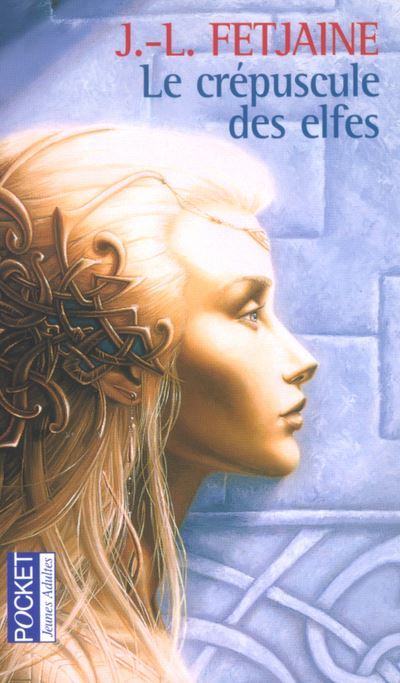
OFetjaine is a historian, and I guess he's really interested in Arthurian mythos especially, because he loves it so much he's written two separate high fantasy retellings of them! I'm not criticizing, mind you, we all need a hobby.
The former, the Elves trilogy (pictures above) is very traditional high fantasy. Elves, dwarves, orcs, a world which is definitely fictionalized with a pan-Celtic vibe to it. The holy grail and excalibur are around, but they're relics possessed by the elves and dwarves with very different powers than usual. Et cetera.
Fetjaine also really loves his elves (as the titles might imply), and while they're not exactly Tolkien elves, there's a similar vibe to them. If you like Tolkien and his elf boner, you'll probably like this too. And conversely, if that turns you off, these books probably also won't work for you.
This series also has a prequel trilogy, centered around the backstory of one of the main characters. I...honestly don't remember too much about it, but I liked it, so, there you go, I guess.
I said Fetjaine did it twice. The other series is the Merlin duology, which, as the title implies, is a retelling of Merlin's story. Note that Merlin is also in the other trilogy, but it's a different Merlin; like I said, completely different continuities and stories.
This one is historical fantasy, so it's set in actual Great Britain, and Fetjaine attempts to connect Arthur to a "real" historical figure...but, you know, Merlin is also half-elf and elves totally exist in Brocéliande, so, you know. History.
Okay, that's probably enough fantasy, let me give some classics too.
L'Arbre des possibles et autres histoires - Bernard Werber

Bernard Werber is a pretty seminal author of French sci-fi and I should probably be embarrassed that the only book of his that I read was for school, but, it is a really good one, so I'll include it anyway.
It's a novella collection, and when I say "sci-fi" I want to make it clear that it's very old school science fiction. It's more Frankenstein or Black Mirror than Star Trek, what we in French call the anticipation genre of science fiction: you take one piece of technology or cultural norm and project it into the future.
It has a pretty wide range of topics and tones, so it's bound to have some better than others. My personal faves were Du pain et des jeux, where football (non-American) has evolved into basically a wargame, and Tel maître, tel lion, where any animal is considered acceptable as a pet, no matter how absurd it is to keep as a pet. They're both on a comedic end, but there's more heartfelt stuff too.
L'Ecume des Jours - Boris Vian
(no cover because I can't find the one I have, and the ones I find are ugly)
This book is surrealist. Like, literally a part of the surrealist movement. It features things such as a lilypad growing inside a woman's lungs (and, as you well know, lilypads double in size every day, wink wink), the protagonist's apartment becoming larger and smaller to go with his mood and current financial situation, and more that I can't even recall at the moment because remembering this book is like trying to remember having an aneurysm.
It is also really, really fun and touching. Oh, and it has a pretty solid movie adaptation, starring Audrey Tautou, who I think an international audience would probably recognize from Amelie or the Da Vinci Code movie.
I don't really know what else to say. It's a really cool read!
Le Roi se meurt - Eugène Ionesco
Ionesco is somewhat famous worldwide so I wasn't even sure to include him here. He's a playwright who wrote in the "Theater of the Absurd" movement, and this play is part of that.
The premise of this play is that the King (of an unnamed land) is dying, and the land is dying with him. I don't really know what else to say. It's theater of the absurd. It kind of has to be experienced (the published version works fine, btw, no need to track down an actual performance, in my humble opinion).
The Plague - Albert Camus
You've probably heard of this one, and if you haven't, let me tell you about a guy called Carlos Maza
youtube
I'm honestly more including this book out of a sense of duty. The other three are books I genuinely liked and happen to be classics. This book was an awful read. But, um. It's kind of relevant now in a way it wasn't (or didn't feel, anyway) back in 2008 or 2009, when I read it. And I don't just mean because of our own plague, since Camus's plague is pretty famously an allegory for fascism, which my teenage self sneered at, and my adult self really regrets every feeling that way.
Okay, finally, some more lighthearted stuff, we gotta talk about the Belgian and French art of bande dessinée. How is it different from comic books or manga? Functionally, it isn't. It really comes down more to what gets published in the Belgian-French industry compared to the American comics industry, which is dominated by superheroes, or the Japanese manga industry, which, while I'm less familiar with it, I know has some big genre trends as well that are completely separate.
The Lanfeust series - Arleston and Tarquin
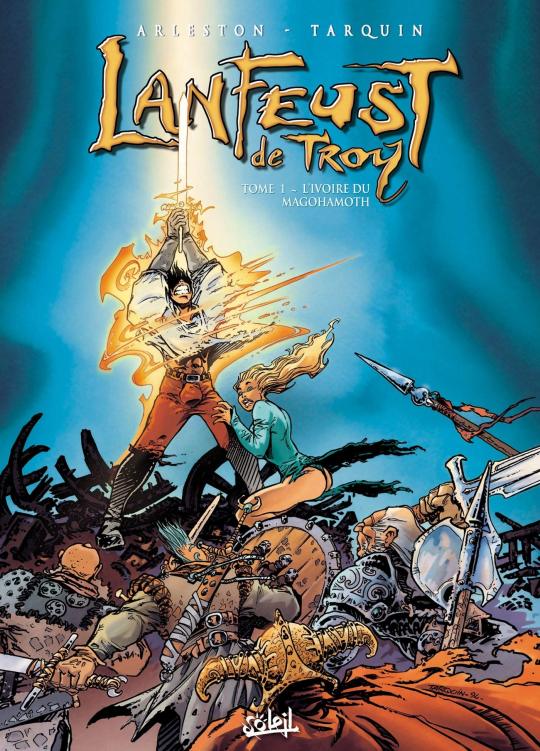
This is a YA mega-series, and I can't recommend all of it because I've lost track of the franchise's growth. Also note that I say "YA", but in this case it means something very different from an American understanding of YA. These books are pretty full of sex.
No, when I say YA I mean it has that level of maturity, for better or worse. The original series (Lanfeust de Troy) is high fantasy in a world where everyone has an individual magical ability but two characters find out they're gifted with an absolute power to make anything happen, and while it gets dark at times, it's still very lighthearted throughout, and the humor is...well, I think it's best described as teen boy humor. And it has a tendency to objectify its female characters, as you'll quickly parse out from the one cover I used here or if you browse more covers.
But still, it holds a special place in my heart, I guess. And on my shelves.
The sequel series, Lanfeust des Etoiles, turns it into a space opera, and goes a little overboard with the pop culture reference at times, though overall still maintains that balance of serious/at times dark story and lighthearted comedy.
After that the franchise is utter chaos to me, and I've lost track. I know there was another sequel series, which I dropped partway through, and a spinoff that retold part of the original series from the PoV of the main love interest (in the period of time she spent away from the main group). There was a comedy spin-off about the troll species unique to this world, a prequel series, probably more I don't even know exist.
Les Démons d'Alexia
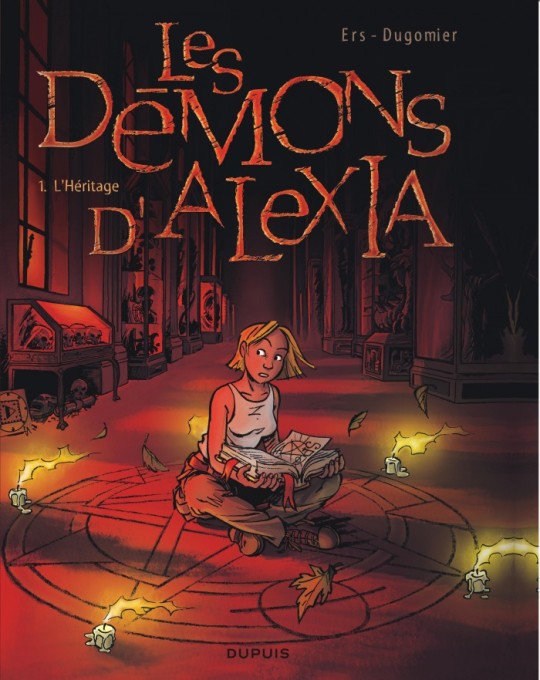
Something I can probably be a little less ashamed of including here.
Some backstory here. The Editions Dupuis are a giant of the Belgian bande dessinée industry, and for many, many years I was subscribed to their weekly magazine. That magazine was (mostly) made up of excerpts from the various books that the éditions were publishing at the time; those that were made of comic strips would usually get a couple pages of individual scripts, while the ongoing narratives got cut into episodes that were a few pages long (out of a typical 48 page count for a single BD album). Among those were this series.
For the first few volumes, I wasn't super into this series, probably because I was a little too young and smack dab in the middle of my "trying to be one of the boys" phase. But around book 3 I got really invested, to the point where I own the second half of the series because I had canceled by subscription by then but still wanted to know more.
Alexia is an exorcist with unusual talents, but little control, who's introduced to a group that specializes in researching paranormal phenomena, solving cases that involve the paranormal, that kinda stuff.
As a result of the premise, the series has a pretty slow start since it has to build up mystery around the source of Alexia's powers, but once it gets going and we get to what is essentially the series' main conflict, it gets really interesting.
Plus, witches. I'm a simple gay who likes strong protagonists and witches.
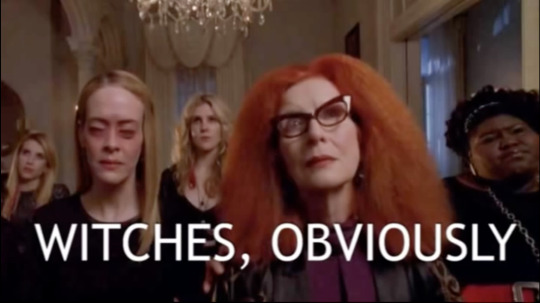
Murena
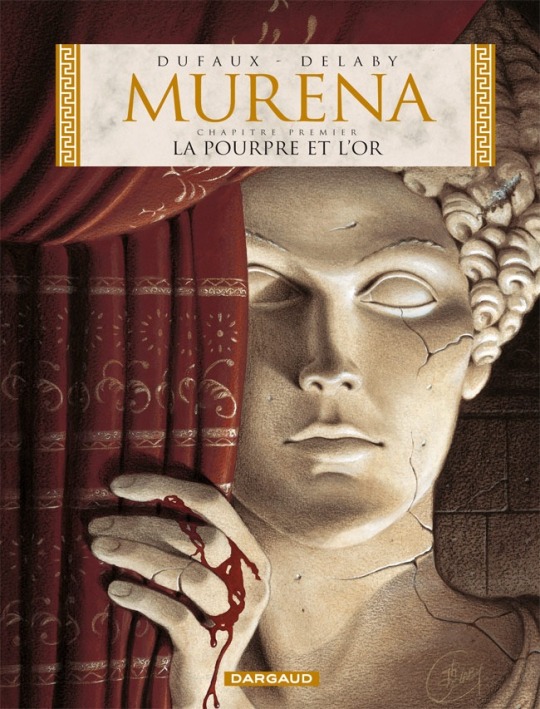
There was a point where my mtyhology nerdery led me to look for more stuff about the historical cultures that created them, and so I'd be super into stuff set in ancient Rome (I'd say "or Greece or Egypt" but let's face it, it was almost always Rome).
Murena is a series set just before the start of Emperor Nero's rule. You know, the one who was emperor when Rome burned, and according to urban legend either caused the fire or played the fiddle while it did (note: "fiddle" is a very English saying, it's usually the lyre in other languages). He probably didn't, it probably was propaganda, but he was a) a Roman Emperor, none of whom were particularly stellar guys and b) mean to Christians, who eventually got to rewrite history. So he's got a bad rep.
The series goes for a very historical take on events, albeit fictionalized (the protagonist and main PoV, the titular Lucius Murena, is himself fictional) and attempts to humanize the people involved in those events. Each book also includes some of the sources used to justify how events and characters are depicted, which is a nice touch.
It's also divided in subseries called "cycles" (books 1-4, 5-8 and the ongoing one starts at 9). I stopped after 9, though I think it's mostly a case of not going to bookstores often anymore. Plus it took four years between 9 and 10, and again between 10 and 11. But the first eight books made for a pretty solid story that honestly felt somewhat concluded as is, so it's a good place to start.
#pierre bottero#la quête d'ewilan#erik l'homme#le livre des étoiles#phaenomen#pierre grimbert#le secret de ji#jean louis fetjaine#la trilogie des elfes#bernard werber#l'arbre des possibles#boris vian#l'écume des jours#le roi se meurt#eugène ionesco#albert camus#la peste#the plague#lanfeust#arleston#tarquin#Les démons d'alexia#ers#dugomier#murena#dufaux#delaby#ask#anonymous#st: other posts
24 notes
·
View notes
Text
The Stigma Of The Trophy Wife & Why I'm Proud To Be One

Trophy wives and the never ending stigma... So much to say and so much to address. In this blog post as you read it in the title is all about why being a trophy wife (TW) is what I was meant to be. And most probably who you're meant to embrace too.
Keep reading Sister.
First of let me start with this mini clip...
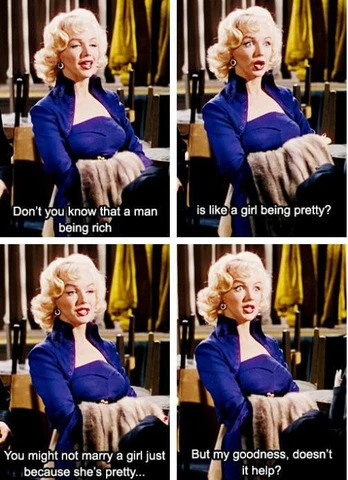
This is all self explanatory to me and many other women who believe in hypergamy. The natural selection and order of things for women who desire to be married to a masculine man.
There's SO many negative cliche about being a trophy wife. The main one being a pretty air-head married to a rich old guy waiting to die so she can inherit all his assets and money.
And then you hear everyone around you saying things like: "why do you want to depend on a man? beauty doesn't last forever and some day he will replace you with someone hotter and younger"
But to me this is coming from such a small minded and scarcity point of view. These idea are filled with lack of everything.
There's SO, so, so much more than this about thinking of yourself as a TW!
Let's address a few of these points though because that is very important.
The "pretty air-head" Idea:
Who said that beautiful women were air-heads?
Just like everyone in this world, God has created each one of us, and you, with a special gift that NOBODY will ever provide like you do it. And that's a FACT.
I personally have worked for the largest and most successful companies in the world during my corporate career. As a people manager in technical supports, and I was VERY successful. These are definitely NOT the type of jobs or accomplishments an air-head would ever reach.
(If you're reading my blogs for the first time, Hello, My name is Mrs Queen and I'm the proud owner of this eCommerce business.)
And so, since when do we have to chose? I mean, hello scarcity mindset!
How being attractive, and maintaining your physical appearance ever kept you from being knowledgable and intelligent?
The "You'll always have to look pretty for him to stick around" Idea:
I cannot explain how this idea to me is SO basic, and SUCH a poor mindset!
Whom ever said that, clearly DOEN'T understand what makes a man marry you, when he truly believe that you're the woman of his dream. Or what makes a man stay with you for the rest of his life. So I'm going to spell it out loud, and preach. I hope you're ready?
First of all, a man stay kept if HE wants to stay kept. That has nothing to do with you but let's not ignore the following because these are contributing factors.
As a woman you're a WHOLE soul and PACKAGE by yourself. You do NOT ever or ever had to be with anybody to complete you. EVER. let me say it again, never, EVER.
And men DO understand that. They're looking and craving for that ENTIRE package. They want to experience it they want to live in it, forever and ever. This is literally their number one reason of living and striving in this world.
Yes, their MAIN reason to be alive. I'm not exaggerating.
What package am-i talking about?
Ok let's start with the obvious one:
1/ Your beauty.
yes your face and body. And all appearances are appreciated in this world.
If you're thinking "high maintenance" and or "too exhausting" let me tell you the following very simply.
The way you care and take pride in your appearance has NOTHING to do with a man.
Never. EVER.
It has however EVERYTHING to do with how YOU, my sister, honor and love yourself. It's your way of respecting and glorify God's creation of you.
And if a man (your husband) gets to enjoy the perks too, that's his luck.
So don't allow laziness, or misconceptions to twist your mind. Taking care of yourself, and maintaining yourself is your godly duty as a woman. Let me say it again, it's self love and self respect.
Then,
2/ Your Feminine ENERGY.
I'm literally talking about how your presence makes him feel. Have you ever had a phone conversation or just met someone and the tone of their voice, their smile gave you goose bumps and elevated your energy right away?
Making you smile, and feel warmer inside? That's what I'm talking about. Some people have the power to project their amazing energies into you and make you feel amazing in split-seconds. Everyone is of course different but the ones who love you, DO feel the energy of your soul.
And masculine men CRAVE for the feminine energy. The loving, the kind, the healing, the peaceful, resting, warm energy. They NEED you to be fully immersed into it, and let him join you into it.
They will do and pay anything to help you sustain and protect this beautiful environment. And it starts with the place you live in. Your body (back to point 1). Then your home. and the rest of your universe.
3/ Your RESPECT for him: This goes way deeper than the way you love him. Men will ALWAYS prefer being respected than being loved if they had to chose between the two. If you haven't read them, check out these books:
Love & Respect: The Love She Most Desires; The Respect He Desperately Needs
5 Love Languages
These are most definitely books that WILL drastically improve your relationship for the better. Feminism has us fooled with many ideas, and yes I'm fully aware that this movement gave the western woman many rights, and I'm not talking about this.
The movement also pushes women to violently disrespect men in MANY different ways, on a daily basis. Making you believe that it's a synonym of empowerment. It's not, it truly isn't. It's the number one key to ending your days living in an apartment with hundreds of cats.
4/ Your brain & your drive:
Masculine men do not want air-heads anyway. They want smart driven women who know how to balance all the things stated before and their lives.
A woman who can literally put all this shit together. HER shit together I should say to be more exact. DO not try to rule his life. That's HIS job. Not yours.
A masculine man wants to lead most of the times. LET him. If you believe and trust him, this won't be hard for you to do.
If not, and I mean if you deeply believe that your man cannot lead the way in your relationship, then you probably chose the wrong kind of man for you. It's never too late to find the right one.
Please note: These points ARE the WHOLE package and aren't in any particular order. One doesn't compensate for the others. ALL, meaning EACH one of them are part of the whole package that is you.
So what's a TW then?
It's in masculine men's nature to want to provide, it DOES NOT mean that you shouldn't have your own. As a matter of a fact it is crucial that you have your own AND let him provide.
One idea that I love the most in Islam, is that it is clearly stated that a man has to provide for his household and his wife's need. Only then a woman will submit to him and respect him fully. She can however have her own sources of income and decides if she wants to participate in the household spendings OR not.
Other religions have similar ideas too.
A TW is literally what ever you want to be. But most importantly she KNOWS how to be the most unique version of herself. And that IS ENOUGH.
But then what if you just do NOT want to work?
It took me a while to come up to a very simple realization. And that's because while growing up my mother always pushed me to "be independent". And to this day she still does.
I had to pounder very deeply on these things.
First of all, your value as a woman does NOT depend on what you can "bring to the table". It never was and never will.
Your value does NOT depend on how productive you can be. How much money you can earn, how much achievements you can reach. NONE. OF. THAT.
You are WELL worthy of being loved and taken care of, and just simply existing because you do. period.
Let me say it differently. You were born WORHTY. There's NOTHING that you have to do to be worthy. Your man, husband should know and appreciate that at it's right value.
You are NOT a financial burden. You ARE valuable, without having to do or achieve ANYTHING.
Your value is in you BEING you. Going back to the "whole package" idea.
Is this laziness?
I know these days if a woman doesn't want to work, she's labelled lazy. It's not. It's about understanding that the "whole package" is contribution in itself. It's HIGHLY valuable.
As I said, it's a man's reason for living, so he can experience that "package" with you.
But the scriptures say that you have to be a hard working woman at home or an active member of the society....
Yes. And you already are. Directly or indirectly. A woman who lives in her "whole package" vibe is an inspiration of everyone around her. That's her CONTRIBUTION to the world if she feels that it's enough. So it is. And there should be no room for shaming this.
And the ones shaming these women, are the ones who don't understand what I just wrote about.
The idea of "Keeping your independence"
I cannot believe how much I have been SO stubborn in grasping, holding on SO damn hard on my "independence"....
As mentioned growing up that's something my mom kept on repeating to me. That's because her marriage to my father was far from being exemplary. And I get her from those circumstances.
Let me remind you if you had a mom like mine, you are NOT your mom and your husband is NOT your father. Therefore your marriage and experience with it ARE NOT the same.
My simple question to you is: Why would you want to feel "independent"? How does being married truly makes you feel? Trapped in any ways?
I pondered so hard on this one. As a married woman I DO NOT want to be independent. I am married. Independence is the complete opposite of marriage.
Do you want independence still? Then be single! you'll have plenty of independence.
Marriage and being a wife truly requires from you to completely abandon your maiden self. That's only then that true union is ever possible. Marriage is two people coming as one. If you have found a husband that you love and loves you back, you won't need to feel independent.
We very often take love and relationship advice from women who are still wounded. My mom for example is currently single.
And the teaching she can ever pass on me are the ones of a woman who's been through three failed marriages. That's precisely why I do NOT take marriage advice related to "staying in a successful marriage" from her.
Who have you been listening to so far? Are they in the type of marriage that you aspire to be in? If not, then I invite you to reframe your way of thinking around what they taught you to believe.
The "he will go for someone younger" idea:
Ok, yes that happens, because some relationships aren't meant to last forever. But who says YOU won't do that before he does?? Or leaving him for a better option? Who will treat you better if your current one starts tripping? THAT right there is the TW mindset.
Because you know your value, and the value of being the "whole package".
Your aging DOES NOT diminish your worth or value. It does NOT. The way you perceive yourself is the ONLY factor that can have that effect ladies. Not a man. Not what your mom would say. Or what your "friends" who mean "well", or your community members will say.
NONE. OF. THAT.
It's you vs YOU.
So why wouldn't you feel proud to FULLY be your own FULL package anyway?
You can have it, so flaunt it for you, for God, and your (future) lucky hubby sister.
Popular Reads:
How To Preserve Your High Value & Feminine Energy During A Crisis
How Dressing More Feminine Will Change Your Life
Save It On Pinterest

15 notes
·
View notes
Text
Powerless Aizawa
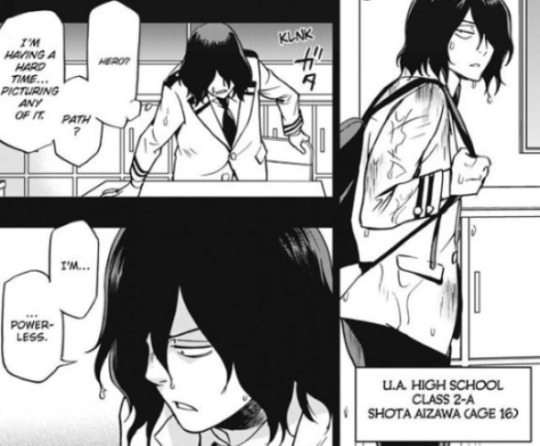
Aizawa Shota is introduced to us as an overly harsh and strict teacher, who pushes his students to their absolute limits and seems to prefer sink or swim mentor styles. This is however an outward personality he projects, to appear strong, to appear in control of things. We know now that Aizawa is one of the most deeply caring charaters in the series, so why does he feel the need to act so aloof and unemotionless, strictly rational at all times?
We learn a lot of his backstory in My Hero Academia: Vigilantes, the canon prequel and it informs a lot of his behavior in the main story. MORE ANALYSIS UNDER THE CUT.
1. Aizawa Appears to be in Control
Aizawa is introducted to us as an incredibly strict teacher. One that forgoes the policies of the school and expells students on a whim if they do not meet his own personal standards. Aizawa’s soft side is known to us now, but it’s also important to remember that he still even now embodies the philosophy “cruel to be kind.” He almost never lets his soft side show around his students, and he prefers to appear as a harsh teacher in front of them at all times. This is still his main way of engaging with the world.

Aizawa believes niceties, showing compassion, all of those things are secondary to raw technical merit in hero work. Which is ironic because Aizawa’s shown a lot of compassion, especially for those younger than him who lean on him for emotional support. But the person who he really is, and the person he presents in front of his students are two different people, as different as night and day. He even repeats this bevaior in the light novels. SCHOOL BRIEFS. Vol 1.
Shota Aizawa made a point of living his life rationally. In other words, cutting out all that was unneessarey, extraneous, or wasteful. Accordingly, he had no preferences when it came to food or clothing, because time spent fussing over such things was time wasted. His hair was long and unkempt, and his otufits were all identical, or at the very least indistinguishable from one another. In his eyes, the only point of eating was to nourish oneself, so he mostly subsisted on nutrient jelly. Clothing and living spaces that emphasized form over function and comfrot were absurd, cooking elaborate meals and caring where the ingedients were grown or processed was nonsensical.
For Aizawa everything other than raw technical merit is unnecessary. He breaks people down to what they are capable of and tends to see them as that first. In a way Aizawa while aware himself of the flaws of the hero system that he was also once excluded from, sometimes repeats those same flaws. He almost expels Deku for having a quirk that’s not compatible with his body on the first day, rather than you know, trying to help him or teach him better ways of using his quirk.

Since he reduces everything to raw merit and achievement, he tends to reduce students down to their potential and doesn’t even bother to teach those he sees no potential in. Its an elitist and flawed metho of teaching. Teachers are supposed to you know, teach, not let the students fall through the cracks intentionally.

Especially since Aizawa is already aware they exist in a flawed system that lets people like Midoriya fall in the first place, and at the start of the manga it seems his policy is to just let them fall and put all the responsibility on their shoulders for not being good enough. That’s a sign of poor teaching, because as I said, those students were going to fall anyway. Not bothering to try, letting the weak fall, and paying all attention to the strong, that’s just reinforcing a broken status quo instead of trying to improve the students like a teacher ought to. Aizawa is the first and only person to notice, and lecture Deku for how self destructive his actions are but at the same time he doesn’t do anything substantial about trying to dissuade him from that. It’s something that could be solved with like, a personal talk, telling Deku that actively harming himself over and over again is something that will destroy his chances of being a hero, but Aizawa just lets Deku fall flat on his face because he emphasizes learning it on his own so much.


Aizawa’s method of teaching is sink or swim. He lets them fall entirely on their own and doesn’t himself seem to care if they drown. He’s as harsh as possible and treats first day students as if they have the same do or die consequences as professional heroes. Even though a necessary part of learning is making mistakes.
Aizawa calls this his kindness, but once again Aizawa only ever allows himself to show that kindness in indirect ways. He only ever allows himself to be strict, because anything else is unnecessary.
In other words, the way he teaches is so that his students will be prepared for everything. He expects them to be in control at all times, and overcome any circumstances. And his way to teach themt his is to not adequately prepare them, and throw them headifrst into things so they will learn to adapt to almost anything. He doesn’t warn them aduquately ahead of time, because Aizawa believes the world to operate that way.
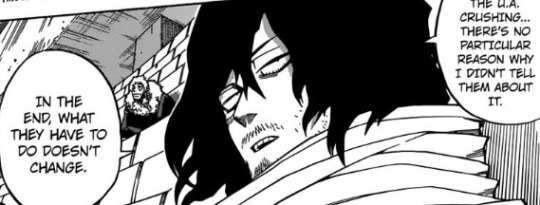
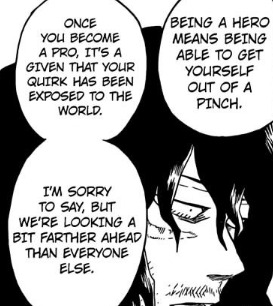
The world is not logical, it is illogical. Heroes are not working under controlled circumstances like in a classroom, they are entirely uncontrolled. Aizawa himself believes that since it’s impossible to control everything he has to send his students into these situations as blindly as possible so that they can learn to survive basically in the wild. The strong will survive, and the weak won’t, and because of that he believes that those who are going to be crushed like this are better off being crushed.
He doesn’t prepare them, because he thinks they’ll never be prepared enough. So they have to learn to survive unprepared. Aizawa is like this with all things, projecting the harshest personality possible, removing the extraneous, acting in the quickest most efficient ways. Because he believes his mistakes get other people killed, and there’s no recovery once he’s made a mistake. You can see this even in the way he deals with villains, he jumps straight to torture in about ten seconds. Aizawa is completely brutal.

Aizawa himself even realizes it at times. By raising his students as efficiently as possible, sometimes he neglects the fact that they are kids, because he’s raising them primarily by strengthening their quirks. He even admits that nobody thought Bakugo after being kidnapped for several days and having his kidnapping made national news and All Might getting hurt as a result of it might need a few days of guidance. Aizawa is a part of a system that reduces kids down to their quirks and their strength, and sometimes he reinforces that system even when he’s aware of its flaws.
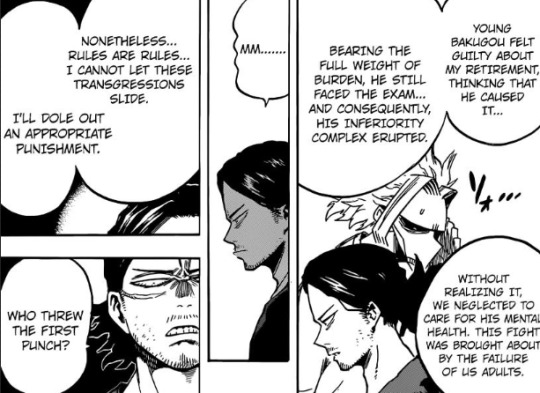
Because Aizawa as a flawed character, is still shaking off the flaws of the system he was raised in as well. He’s still learning from his students in the same way he is teaching them.
Even though Aizawa’s quirk is suited to teamwork, not only does Aizawa work entirely by himself alone at night as a hero, but he also teaches his students this as well. His methods which are basically sink or swim or survival of the fittest basically emphasize individual strength above all else, because he believes their greatest merit of a hero is their ability to survive every situation on their own, without making mistakes that could be costly. He believes out their in the wild, nobody is going to help you if you fall and all you can do is learn to overcome entirely on your own with sheer strength.
That you as an individual have to be in control of everything, in order to be a hero. This isn’t what Aizawa actually believes though, it’s what he wants to project. He is essentially, an overly harsh control freak when it comes to his own life (hence why he devotes it to 100% hero work, teaching and literally nothing else) and that is all a response to his trauma.
2. Aizawa is Afraid of Everything He Can’t Control
The reason Aizawa is so strict, and always employs sink or swim methods comes from his youth. Aizawa has dealt with feelings of powerlessness all his life, especially because his quirk is not suited to combat the way other heroes quirks were.
Aizawa has an extremely low image of himself. Due to the fact that he’s not personally strong enough to save everyone, he therefore cannot save anyone. He fundamentally views himself as a weak person incapbale of saving others especially because his quirk is weak on its own and not suited for combat.
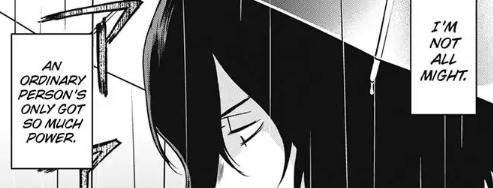

Aizawa is extremely harsh, but he’s harshest on all on himself. To him the worst thing is failing to save someone, so therefore if he thinks he’s not prepared for the responsibility of saving someone he won’t even try. Part of the reason Aizawa does not reach out to others as much is this overhwleming sense of responsibility he has. If he gets involved he’s responsible for everything. If things go out of control, he will be the one responsible for not being strong enough to handle it on his own. The same can be applied to his students, if one of his students goes out into the field and dies because they were unprepared, it’s his fault for not teaching him properly. So he gives up on and doesn’t even bother to teach the ones he doesn’t want to take that responsibility for.

In the flashback, Aizawa begins to change little by little when he sees someone who recklessly takes the leap and saves the cat anyway with no thought at all, whereas Aizawa himself is constantly held back from showing how much he cares by his own thoughts of inferiority. He’s kind but he never allows himself to be, because he believes he’s too weak to be kind, to be able to help others, so he only ever shows it in indirect ways.
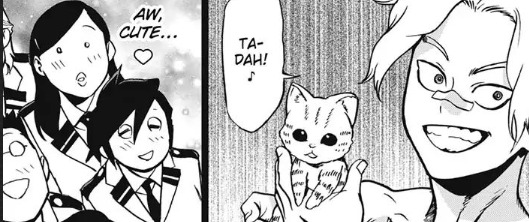
We see a lot of Aizawa reacting to the world around him. He can’t do anything on his own because of his quirk, and therefore he sees it as wrong for him to rely on others. He sees himself as weak because he needs others and doesn’t excel in individual strength.
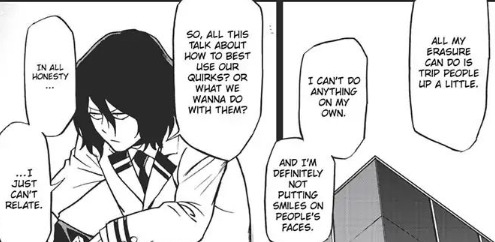
Aizawa’s goggles come from that same hero who he saw as able to take the reckless leap and save people instead of getting caught up in his own self doubt. HIs closest friend at the time. When he started to wear those goggles, to lean on him for assistance, Aizawa started to improve. There is no way he ever would have improved if not for that friendship, that thing which modern day Aizawa considers so extraneous.

Shirakumo breaks through Aizawa’s beliefs that he has to do everything on his own and shows how strong he can be as a part of a team. What was wrong with Aizawa was not that his quirk was weak, but he was too isolated, unable to let anybody help him and therefore constantly stuck with his own self destructive thoughts, and far too aware of his own weaknesses.

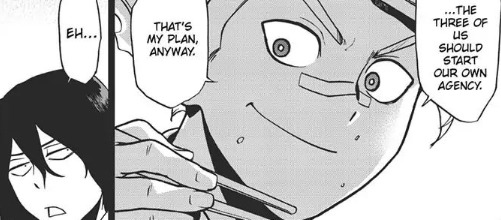
Aizawa is still not able to do everything on his own, but he learns that if he relies on Shirakumo the two of them are stronger as a pair together. They don’t have to destroy their indiidual weaknesses, because both of them can cover for the others weaknesses. It’s not the strong surviving the weak, he’s in a situation where it’s okay for him to be weak and still make use of his quirk to the best of his ability. He doesn’t need to stand on raw combat ability and power alone.


Being suited to teamwork instead of having a strong individual quirk isn’t presented as a bad thing at all. It’s at this point that Aizawa had the healthiest view of his own quirk, and the way heroes should operate in his life. He was close to breaking the status quo and overcoming the society that had made him feel bad about his own quirk all of his life.
But then we witness Aizawa’s point of trauma.
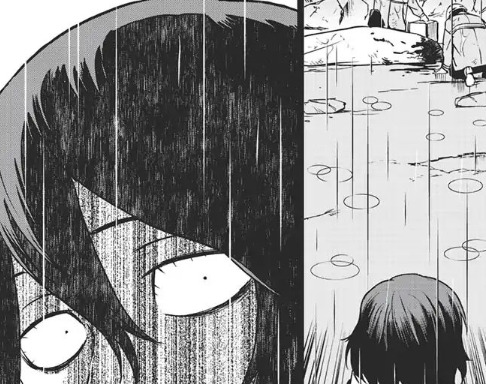
His closest friend dies not to a heroic sacrifice, but just a random accident. Just rocks falling. Something Aizawa is completely out of control of. Something AIzawa did not expect at all. He didn’t even get the chance to fight back, it was sudden accident that took a human life.
Not only that but at the time Aizawa then had to fight the villain all by himself. Not only that, but he’s praised for being strong in that moment and taking the villain down alone rather than relying on other people.

And that’s what broke Aizawa. He really did rely on people. He did work as a part of a team, and was emotionally open to other people around him. Relying on others and not his own strength, not being prepared for everything led to his friend dying by falling rocks. In a moment that was completely out of control, he lost his friend and was fored to fight entirely alone.
And that is how we see the Aizawa of the current day. He works alone, he believes that people have to survive on their own or they won’t make it into the own, he believes that those who are just falling he should just let them fall because it’s kinder then sending them out into the world. Shirakumo died in a situation entirely out of his control, and now Aizawa seeks to control everything.
Aizawa as an adult is a fully realized hero who works mostly on is own, who is strong enough to fight alone, and yet carrying Shirakumo’s death with him he still feels completely powerless. It’s those feelings he has to unlearn. The emotional connection with his students has taught him far more than lecturing them on quirks ever has.
#aizawa shota#shota aizawa#eraserhead#mha meta#my hero academia meta#my hero academia theory#my hero academia character analysis#meta#mhav meta
231 notes
·
View notes
Text
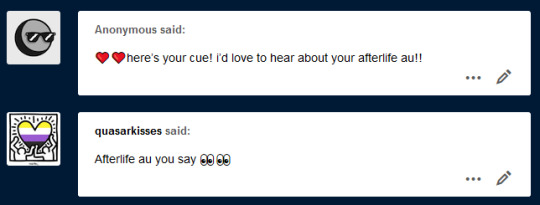

ye s, well
it basically came to me like a prophet receiving a vision from an angry god. you know. like brian david gilberts video ideas but with more slow burn.
no really i wrote all this down in my phone’s note app because some nearly coherent things popped up in my head every time i was on the train or bus these last few days.
(after-actually-writing-this disclaimer/note: this is 2000 words of slightly edited rambling about Bagginshield in the Afterlife. i had to put it in a read more.)
so the gist of it
the botfa goes just as in the movie with minor details altered. like bilbo kissing thorin just before he dies which inadvertently causes a ripple in time and space that makes the valar curious of them both. you know. minor stuff.
so bilbo goes back to the shire, the war of the ring goes down, and the hobbit/elf gang sails to valinor at the end. classic stuff, not much alternating of universes here.
but here’s where things turn into the “my city now” meme because DUDE DO I HAVE A LOT OF THOUGHTS ABOUT VALINOR AND HOW THE AFTERLIFE WORKS
like, I’m sorry mister jolkien rolkien tolkien, but just putting people into a hall to await being judged like a hospital waiting room? snooze, that’s boring!
so first of all, and you can fight me on this, Yavanna Made The Hobbits And You Can’t Change My Mind.
it just makes sense for her to have been very saddened by the destruction of literally all her work on arda through melkor’s poison, so she made living, growing things that could protect themselves from harm. as opposed to the ents, by the way, which were made by Eru to protect all the other living, growing things. it was a nice gesture of Eru to make those, but not quite what Yavanna wanted or had in mind, i imagine.
as with the dwarves, Eru wasn’t all happy about the existence of another race he didn’t make but you know, whatever, ‘I’ll just let this married couple have their own kids aside from mine, it’s okay’.
so he hands both the dwarves and the hobbits independent thought and free will, but under the condition (and here is where the afterlife stuff comes into play) that Aule and Yavanna be responsible for their mortal creations after their death. meaning that both races have seperate afterlives from the halls of mandos, MEANING THAT ITS COMPLETELY FINE FOR AULE AND YAVANNA TO BE LIKE “oh look honey, these two are so very in love and remind me of us, shan’t we do something about that?”
so. they do something about that. more precisely, they rearrange their afterlife-realms so they’re next to each other and someone with enough willpower could cross through the barrier. because listen, they’re valar, they can do whatever they want just for kicks.
okay so after that tangent lets get back to the meat of the matter: gay dwarves. I know not everyone has read Sansukh, a 500k word mammoth of a fic, and I don’t really intend to copy any of det’s canon, but their version of The Halls of Mahal really inspired me. basically the dwarven afterlife is one big hunk of a mountain/underground city where they’re free to live their days until dagor dagorath doing what they do best in the company of their families and friends; like smithing, crafting, building and other JustDwarrowThings.
meanwhile the hobbit afterlife is Basically The Shire and instead of being given the materials to build things, all the hobbits who go there get to grow plants and do their gardening. they don’t have to- just like none of the dwarves have to craft stuff- since there’s always enough food for everyone, but they are just allowed to do what they do best if they so desire.
now when Bilbo arrived in the undying lands he was still Old As Hell and im sorry to put it this way, he definitely kicked the can after like, a week of living there. not really so undying, them lands, huh. anyway Bilbo bites the dust and LOOK AT THAT he’s suddenly young again, and another LOOK AT THAT he’s standing in a very comfy, but Not Quite Bag End hobbit hole that has a note hung up on the front door. you wouldn’t think gods could have handwriting but hey, again, they’re gods they can do whatever. the note just tells him that yavannah made this place special and just for Bilbo but that there’s another home waiting for him. very cryptic there, lady. he doesn’t leave at first because hey, his family is here. there’s a lot of reunions and celebrating and food because its the fucking hobbit afterlife, what else would you expect
it takes him a few days of Regular Hobbit Life in his new home to realise ‘holy shit, this is so boring’ so what does a Fool of a Took do when things get boring and there’s a note urging him to do something?
HE’S GOING ON AN ADVENTURE
so Bilbo runs through the whole not-shire, meeting all sorts of people he outlived on the way (looking at you, Lobelia), as well as some elves. because elves can definitely just waltz through all the afterlives. they can walk on top of snow, you think they wouldn’t walk around wherever they please in valinor? rip to mankind, but they’re different.
he gets to the furthest reaches of it eventually, and lo and behold, what awaits him but the view of a tall mountain, an invisible barrier and a very flustered Thorin who is at his wits end as to how Bilbo even got here.
now for thorin’s part of the story we’ll have to start after the botfa again. he basically woke up in the darkness like an episode of naked and afraid, and started talking to Aule. his maker, who loves him to bits by the way since he made thorin, just tells him he’s free to go wherever his heart takes him. again with the cryptic messages from the gods.
so thorin, still very self-loathing and bitter because of his actions right before his death, sees this as Mahal’s way of saying ‘please don’t step foot in my halls u disgusting litle creacher’, when really he just meant ‘please do some well deserved self reflecting and then come inside to be with your family, they all miss you terribly’.
after his chat with the maker thorin just spawns in right at the front gate of the mountain and he has a choice to make. go inside or stay outside. and we all know Thorin’s proclivity for drama so he basically spends LITERAL YEARS just living in self imposed solitary confinement.
oh also tiny hc here, thorin was said to have taken “any work offered to him in the towns of men”, and they showed him in a smithy, but personally I believe they meant it when they said “any kind of work”. so basically thorin is a jack of all trades, master of some. he definitely has master-level skills in certain areas though, enough to build a vaguely hobbit-hole shaped house. why is it hobbit hole shaped?
oh right, the part where Thorin is absolutely enamoured with Bilbo.
"Go back to your books and your armchair, plant your trees, watch them grow. If more of us valued food and cheer and song above hoarded gold, it would be a merrier world.”- HELLO? GAY POLICE? I’D LIKE TO REPORT A CASE OF ‘DWARF KING REALISING THAT THE HOBBIT WAY OF LIVING IS A REALLY GREAT ONE IN CONCEPT / WISHING HE COULD HAVE HAD THAT KIND OF LIFE WITH BILBO’
anyway it’s a long 80 years until Thorin does get to meet Bilbo again, and in the meantime we have one of my favorite additions to any Hobbit fanfic ever: Frerin
For the uninitiated, Frerin is Thorin’s brother. They also have a sister, Dís, but Tolkien never specified when she died and she was a bit younger than Thorin and Frerin so I reckon she’d still be alive as an old dwarf lady somewhere?
Anyway, Frerin. Oh boy. Sansukh, again, does an excellent job at turning Frerin into a character with a level of authenticity that gets real fucking close to Genuine Tolkien™, so most of my own characterisation of Frerin is based on that in Sansukh. With the important omission of the dwarves not being able to see the present/their still alive loved ones in middle earth through a magic mirror pool.
so Frerin takes it upon himself to leave the mountain in search of his brother because he really does want him back. but also because Mahal has had it with Thorin’s antics and suggests Frerin fetch him so he can finally reunite with his family. Mahal doesn’t talk to the dwarves a lot because he’s like an awkward and distant dad, but he does actually speak to them.
so Thorin is supposed to go see his family, which he does, but not immediately. it takes like, a solid year of just brotherly (and sister-sonly) companionship for him to open up about all his anxieties and regrets and THEN he goes into the mountain to cry in his mother’s lap. as you do.
however Thorin still feels like he doesn’t 100% belong with the other dwarves in there, so he frequently spends long stretches of time outside, building away at his house, thinking about Bilbo. the company goes out to visit him sometimes.
more details on the house tho, cuz it’s Important; it’s built halfway into a hill near the mountain, like a proper hobbit hole would be, but the lower levels are built into stone. look, he’s had 80 years to work on constructing this. it’s near perfect in every way for both hobbit and dwarf standards and could definitely fit the entire company and more inside.
now about the barrier. elves can pass through without a second thought because they’re shiny little bastards who just get to do all the cool stuff, but the other races can’t just hop between realms like that; they really have to muster up the willpower. which usually means they can’t do it because a drawback for both dwarves and hobbits is that they favor isolation from other races even in death, and as such don’t want to mingle with each other.
unless you’re Bilbo Badass Baggins though, who simply runs through the barrier to yell at Thorin for leaving him sad and alone for 80 years. he is that bitch.
there’s gonna be some legolas and gimli shenanigans if i can fit them in (cuz i dont know when exactly they sailed west together), possibly a mention of tauriel because bruh peter jackson did us dirty by not giving her any closure besides ‘lol i guess she’s banished from mirkwood??’ and Mairon. because. I also have some thoughts about him.
also Fili and Kili as pseudo matchmakers because every fic needs that
and did I mention there’s gonna be hozier lyrics for chapter titles
i said this was the gist of it but i somehow ended up at ~1900 words. well, more power to me.
#bagginshield#the hobbit#bagginshield afterlife au#this is the most coherent plot summary I've ever done for a fic so please enjoy the trash#also it's my sleepover and I get to pick which parts of canon i'll adhere by
40 notes
·
View notes
Text
songs of impotence and experience
In the last couple years, I’ve revisited a lot of the things that were meaningful to me when I was younger. I’m not exactly sure why I did that. Some nostalgia. Some curiosity about whether they held up. Some sense that maybe I could get some insight into myself. Why did I love the things I loved at a time when my id was more unfiltered? What did the younger version of myself need art about that maybe the adult version doesn’t?
A lot of the works are superficially goofy genre shit, but space ships, aliens and made-up words never really felt like it was what I loved about them. My taste was just as indiscriminate as a kid as it is now, which meant I read and watched and liked a wide variety of things. Proper literary things, even. I don’t think it’s an accident that I often connect(ed) with superficially goofy genre shit. Just like I don’t think it’s an accident that a different person might connect with musicals or period movies. But that’s an aspect of my personality to analyze another time.
No, what I realized was that all of these space-and-aliens-stories…on some level, were impotence stories. They’re stories about being manipulated by outside forces, or having shit stuck in you against your will. Stories about parasites. Stories about going insane. And while those might sound like “intense” themes for a child or teenager to be preoccupied with (as if children and teenagers don’t feel things intensely), I realized that it actually made complete and utter sense. When you’re young it feels like things are constantly just happening to you. Adults make decisions for you. Society makes demands of you. It’s hard to know what power you even have, let alone how to use it. Of course I’d relate to impotence.
I remember being obsessed with Ender’s Game. I don’t even know how many times I read it between the ages of 8 and 12. There was something in me that identified with being a pawn in an adult’s world, where your intelligence or your allegiance could be used to fight their wars and you’d have no control over it, no understanding of it. This sense that you were hurting others by proxy, fighting the wrong fights, because you didn’t understand how your power was being used. But that you had power. The feeling that if you were smart and special enough to be wanted, or to know that something was up, then you should have been smart enough to change the game.
Of course there’s arrogance in believing that you, a child, are so important that all of these adults want things from you. Arrogance in looking at a 6 year old military genius and going that speaks to me. But the truth is, adults do want things from children, even “unremarkable” children. They might want a child’s validation, obedience, affection, loyalty or even something as simple and benign as happiness. Being an unhappy child when you know your parents just want you to be all right? What a feeling of failure.
There was a sense that all of these adults—including but not limited to my parents—were invested in religion, or politics, or personal narratives, or some view of the world, and I had the power to reinforce it. I could grow up to be a good exemplar of their ideological beliefs, I could give them the feeling that I admired or needed them, I could pay them attention, I could tell them I believed them. But I couldn’t know whether doing those things was what I actually wanted. I couldn’t know if twenty years down the line I’d be yearning for an enemy’s forgiveness, and speaking for the dead.
*
Fast-forward to Farscape. Farscape is about a character who looks like he should be the hero. A character who knows the same hero stories we know, and thinks he should live up to them. But then the narrative makes him alien, and incompetent, and strips him of his every bit of cultural context and familiarity. In a narrative sense, it “feminizes” him. People want things from John Crichton, and it never has anything to do with him as a person (“Don’t be jealous Frau Blücher. He only loves me for my mind.”). Everyone is always hijacking his body and putting things into it. Microbes, needles, knowledge, chips. He spends most of the show with the villain literally living inside his head. An inescapable, macabre companion that aggressively dresses himself in the drag of Crichton’s psyche.
Language is a constant motif in Farscape, because language is how you communicate yourself. If you lack language, you’re impotent. You’re alien. It’s no coincidence that Crichton’s first moment of alien-ation is that he’s injected with translator microbes. It’s no coincidence that A Human Reaction flips repeatedly between how the alien characters sound to humans, and how they sound to Crichton. It’s no coincidence that the final horror of Die Me Dichotomy is that Crichton loses his power of speech. It’s no coincidence that Aeryn starts learning English, and Crichton starts quipping in Spanish. It’s no coincidence that Crichton starts the show speaking in incomprehensible human cultural references to aliens and ends up speaking in incomprehensible alien references to humans (“Fred Scarran. From the Gainesville Scarrans.”).
And not to be unbearably personal, but as a teenage girl who was going deaf, I responded to all of that. On a basic, physical level I felt like I was losing my ability to understand people, and by virtue of not understanding, becoming unable to make myself understood. A feeling of standing outside myself and watching myself become an alien. A feeling of invasion because I could no longer exist without technological augmentation. But there was also a gendered level. Being a girl and feeling like the world’s reaction to my physical form suddenly had consequences that it was up to me to either mitigate or capitalize upon. That sexuality was suddenly something I was supposed to be able to wield, and I had no idea how. This feeling that my body was betraying me both functionally and as my means of mediating between my Self and the world. In other words, a feeling that biology and social narratives were conspiring, like the universe in Farscape, to “feminize” me.
There was a cultural level too. I was aware of being in this American social moment that seemed grotesquely material and political. So are all moments in their own way, but I didn’t know that then. All I knew was that all these people cared about PT Cruisers and Super Size Me and Idiocracy and The Simple Life and Fahrenheit 911 and freedom fries and cartoons of Bush as a monkey. All these adults were begging for me to take a side about these things that felt stupid and ugly and profane. And none their interest in my side-taking had anything to do with me, anyway.
So at that time I wanted a hero’s journey that wasn’t a hero’s journey. I wanted a story about saying “fuck you” to the forces of the universe that were clutching at my hems and driving me insane, and going off to live as an alien and eking what joy I could from it. A story about saying “no” to the two equally evil sides of any evil, pointless war. I wanted a story about how maybe that made you a monster, or maybe that was a heroic thing to do. Maybe there was something horrible about it, but maybe there was something wonderful in it too.
*
Rewind to Animorphs. The whole concept of a Yeerk in your head using your body and speaking out your mouth. If my attraction to Ender’s Game was in part about the fear that adults and institutions were hijacking my abilities, then Animorphs was about the fear that the adults themselves were hijacked. There’s real horror in the idea that your mom isn’t your mom and your friends aren’t your friends, but prisoners trapped in their own minds, being piloted by an outside force. The fear that you’d have to re-interpret your every interaction with the people you admired or cared about, looking for ulterior motives. The feeling that say, your parent isn’t speaking their own beliefs, but rather acting as a mouthpiece for their country or their neuroses or an ad on TV.
One might rightfully observe, well isn’t that just They Live or Invasion of the Body Snatchers? Rhinoceros for kids? Yes, in part. But there’s the additional, crucial fact that these Yeerks only steal people’s bodies because they’re planet-bound slugs otherwise. The Yeerks aren’t an impersonal disease, and Controllers aren’t mindless zombies. The Yeerks are Pilots, just wanting to see the stars. Pilots that didn’t wait meekly for a Leviathan to take them or a PK to tempt them, but went and conquered an empire’s worth of sentient creatures themselves. Pilots we’re primed to see as disgusting instead of pitiable or majestic because they’re just slimy little slugs, right? The Yeerks are the antagonists because they’re the idea that powerlessness begets powerlessness. They’re the idea that you may feel impotent, but growing up to control others just makes you the villain.
It makes sense that the Animorphs are shapeshifters, and young, not just because whatever, these are technically books for children and turning into animals sounds cool. I like to imagine there’s some symbolism about flexibility there. It reminds me of His Dark Materials and the way that a child’s daemon has no settled form. An impossible circumstance? You morph. You don’t take and conquer; you change.
(I’m not reading too much into things when I say that. The books draw parallels between the Yeerks and the Animorphs from the very beginning. Marco pointing out in #1 The Invasion that Tobias wants to escape his life as badly as a voluntary Controller does. Cassie worrying in #4 The Message that they dominate the animals they morph the way the Yeerks dominate their hosts. Later in #16 The Warning they’ll debate the morality of morphing people. “Controlling” versus “morphing” is one of the most central dichotomies of Animorphs, one the Animorphs themselves do not always land on the right side of.)
Disability themes are rampant. Everyone is trapped: Tobias as a hawk, Ax on Earth, hosts in their heads, Yeerks in their pools, the Animorphs in their war. To say nothing of the times the books get explicit about it, like the Andalite taboos around vecols or that final arc when they give the ward of disabled kids the morphing power. And the question every time is, which of two non-ideal options for dealing with some limitation are you going to take? Do you live as a hawk, or do you give up? When the Animorphs give the Auxiliaries the morphing power, it isn’t a triumphant moment. They do it so the kids can fight, like the Animorphs themselves had to. They do it knowing that the kids will die.
That sort of thing was the appeal of Animorphs. They were exciting, funny, imaginative page-turners, sure. But half of the reason they were page-turners was because they centered these terrible ethical quandaries, and devastating emotional choices. That’s the kind of thing that makes you pay attention in fiction: situations where you don’t know the way out, so you don’t know what will happen. The same way you don’t know what will happen once you realize that the adults can’t be trusted, or your life isn’t entirely your own.
*
Here are some things I think are interesting.
I think it’s interesting that both the morphing power in Animorphs and Leviathans in Farscape are the things those works treat as something that can be profaned. Morphing may be described in gruesome, body horrific detail, but nonetheless an animal’s power is treated as something to be respected and used to fight. So David abusing morphing is profane. Visser Three morphing is profane. Similarly, forcing Moya to give birth to a gunship is profane. Cutting Pilot’s arms off is profane. The clones eating the walls of the ship in Eat Me is profane. And both of those, morphing and Moya, are symbols of transformation. Morphing in the obvious sense, and Moya in the sense of a guardian or shepherd or mother. The sacred instrument of your journey.
I think it’s interesting that the protagonists of all three stories change, but not necessarily for the better.
I think it’s interesting that all three stories involve loving and understanding the Other. Both Farscape and Animorphs are full of important interspecies relationships: Tobias and Rachel, Elfangor and Loren, Dak and Aldrea (it’s potentially relevant that Jake and Cassie are an interracial relationship too), or John and Aeryn, D’argo and Chiana (and Lolaan), Zhaan and Stark, Scorpius and Sikozu. Both Animorphs and Ender’s Game involve the protagonists—and the audience, by extension—learning “humanizing” things about the aliens that they’re fighting against. Aliens that have forms that they are not inclined to empathize with.
I think it’s interesting that Animorphs has a lot of the same parasitism versus symbiosis themes that Farscape does, but takes them in a direction that has less to do with sex and breeding (because as unbelievably dark as Animorphs gets they’re still books for kids) and more to do with authority. Where Farscape is full of half-breeds and genetic atrocities, Animorphs is full of gods and Galateas. In Farscape, parasitism versus symbiosis is about becoming alien in a positive way, or a self-directed way, versus being forced into alienation. Loving the Other versus being made Other. Birth imagery versus rape imagery. Whereas in Animorphs parasitism versus symbiosis is about control versus autonomy. How are people supposed to satisfy their competing desires without taking away other people’s agency? How much power should authorities have over the people they’re responsible for (and responsible to)?
#26 The Attack was always one of my favorite Animorphs books because of the way it drew parallels between all of these pseudo-children and their creators. The Pemalites made the Chee, Crayak made the Howlers, and Elfangor “made” the Animorphs. Then those children duke it out for the souls of the Iskoorts and the Yeerks. A literal war of symbiosis versus parasitism. The existence of the Pemalites and the Chee might lead one to think that creating children in your desired image is reasonable and ethical, because we all love dogs don’t we? And then you meet the Howlers, who are simultaneously pure innocents and terrifying killers. Creatures that think of killing as play, as a game of fetch, because that’s what they were made to be. The Howlers are dogs too. You realize that the Animorphs are their own kind of created beings. They were given powers to fight a war for someone else.
In other words, if you look at it a certain way, all of these children have been co-opted and controlled as much as Yeerks co-opt and control their hosts. Animorphs is deeply anti-war. And one of the main ways it’s anti-war is by painting war as something essentially parasitic. Something that chews people up. Something that traumatizes its protagonists from the word go. Something that forces you to make awful moral choices. Something that only happens when competing forces can’t resolve their needs in any other way. War is parasitic and parasitism leads to war.
I think it’s interesting that all of these stories involve war, and none of them are fond of it. They each question and deconstruct the genre of war story that they seem to belong to. Instead of telling a militaristic scifi story about crushing alien Others, and being led by nigh-mythological generals, Ender’s Game tells a militaristic scifi story about child soldiers, bureaucracy, misunderstanding the Other, and how although true genius and leadership exists, it can rarely outsmart the military apparatus that controls it. Instead of telling a campy Power Rangers tale about the wonders of friendship, Animorphs was intended, by the author’s own admission, to be a “grunts-eyed view” of combat that showed the “honest cost” of war. A group of guerrilla soldiers may form bonds and accomplish remarkable things, but their story will not end with medals or Ewok revelry. Instead of telling a utopic Star Trek story where humans are powerful and advanced and have near-imperial influence, Farscape tells a story about how humans are weak and clannish, and advanced imperial powers wage wars based on nothing better than conquest or mercenary interest. Crichton becomes a kind of warrior to defend himself, but he never becomes a soldier. He leads no armies or rebellions. He is nothing more than a bargaining chip in other people’s conflicts. The protagonists of all three stories wrestle with the guilt of having had to kill their enemies on a massive scale, and innocents along with them.
I think it’s interesting how embodied these stories are. There was something novel and arresting to my young brain, reading Peter’s jokes about pubic hair, or the descriptions of Ender smashing a boy’s nose. The feeling of a monitor in your neck, gravity and anti-gravity, the grappling shower fight. It feels uncomfortable and deliberate that these children are described in the “gross”, physical way that adults in boot-camp war stories normally are. There was something mesmerizing about all those descriptions of morphing. Every book there’d be paragraphs on paragraphs about teeth rearranging, legs sprouting, eyes popping, bones liquefying. Descriptions of the hunger and fear (and sometimes delight) of animals. Descriptions of horrifying battle wounds. Limbs removed, intestines spilling out, being eaten alive by ants. There was something affirming in how sexual, and how disgusting Farscape was. That even the puppets got horny, and John and Aeryn kissed like they meant it. That people ate and farted and were full of goo.
Change, symbiosis, bodies, war. I’m not going to overreach and claim that those themes necessarily go hand-in-hand with impotence, or that these three stories I happened to love indicate anything other than that they’re kind of story I happened to love. I recognize that I’ve glossed over potential interpretations or criticisms of these stories in order to draw the parallels that interest me. But I do think that war, i.e. super-personal conflict, and bodies are two of the most fundamental ways that power and selfhood get taken away. You lose yourself when you sign your will over to forces bigger than you, and you lose yourself when you die. Bodies are inextricable from mortality, and are a kind of shorthand for every natural circumstance you can’t control. Whereas change and symbiosis are the hopeful alternatives. Symbiosis means merging with something other, even bigger, than you, but in an inherently mutually beneficial way. You don’t get lost, because it wouldn’t be symbiosis if your needs weren’t being met, but you do become “more.” Change, in turn, implies agency. Nature and circumstance may transform you—transform you to the point of death—but you can also transform yourself. Change is a neutral force that anyone can potentially wield.
*
I don’t know that I need those stories anymore. I still love them, still find them meaningful (in fact I re-read some Animorphs to write this and I was taken aback by just how much I still honestly loved it). But I don’t recognize myself in them in quite the same way. Precisely, I think, because I do have power now. Not a lot. But I have a sense of what I’m good at, and what I can control. I dress how I like, think about what I like, talk to who I like. Having a body is a still a crock of shit, but that isn’t new information anymore. None of the ways I lack control over my life are new information anymore. And so there is less of a need to process the horror of it via fiction.
It was interesting rewatching Buffy, because Buffy was never something that I identified with when I was younger, despite the fact that it was a show about a teenage girl. Possibly because fundamentally, Buffy is a story about empowerment. Buffy has power. That’s the key thing about her. It’s true that like the characters in the other stories, she has been conscripted into a supernatural war against her will. She struggles with her agency, and is increasingly traumatized by the choices she has to make. But she wins. That is the point of her. She’s a classical hero. Her heroism is moving and satisfying because it’s never emotionally easy. It’s earned. But it’s still heroism.
So I was surprised that as an adult, I found myself relating to it. You might look at a season like season six, and think that that’s an impotence story, because a lot of it is about depression and when one is depressed one certainly feels impotent. But I see it more as a story about having agency and not knowing what the hell to do with it. The terror of “you have to make your own decisions now.” And most of the seasons are like that. They involve Buffy accepting some aspect of her power and growing up about it.
I notice a number of the stories I’ve been drawn to in my 20’s have had themes like that. I’ve found myself lingering on stories about women, and stories about confronting one’s agency. As a teenager, I loved Slings and Arrows, because Geoffrey Tennant was yet another character buffeted by outside forces (Art and Social Constraints On Art), with his own, art-related Harvey. But as an adult I was excited by Cayce Pollard instead. Someone who on the one hand is practically crippled by her responses to aesthetic stimuli, but on the other hand (a) uses this to practical effect, and (b) actually spends time examining to what extent her responses are disordered. I was similarly excited by Clarice Starling learning to pursue her taste in Hannibal.
It’s a weird shift, to realize you’re not powerless. It’s not necessarily a pleasant shift. It’s why I’ve never been compelled by empowerment stories that treat it as a triumphant, unambiguously positive thing. Stories that conflate having power with having the judgement or moral authority to use that power well. With great power comes great responsibility, but how do you know what the responsible thing to do even is? If you’re empowered by a story, all it really means is that it made you feel confident enough to make your own mistakes (or not-mistakes, of course) instead of someone else’s. Which can be quite a good and exciting thing. But it also means that if things go badly, it’s no-one’s fault but your own.
So I find that the stories about power that are most satisfying to me are actually stories about things like truth, judgment, and perseverance. Stories about solving problems. Stories about making decisions. Stories about fucking up and carrying on afterwards. Stories that treat self-possession as the hard work that it is.
*
I’m curious about what comes afterwards. Already I find myself itching for a new kind of story, but I’m not sure what. Maybe I’ll go back to needing the horror of powerlessness. Maybe I’ll find religion (the wonder of powerlessness). Maybe I’ll go full nihilism, or full hedonism. When I look at the next fifteen years of my life, I see work, but what stories does one need for that? Stories that explore the ideas that you want to explore yourself? It feels open-ended, in a way. For all that I’ve done all this talk about relating to stories, I’ve never actually explicitly gone looking for stories to relate to and identify with. That’s why I wrote this, really. It’s easy to see why I (or anyone) would be drawn to stories about people who looked me, or had the same experiences as me; less easy to see the deeper, more abstract concerns that speak to what one is preoccupied with. But even given that I’ve never had a very identitarian approach to art, I find myself caring less about relatability than ever. And maybe that’s a phase of development too. The phase at which you don’t so much need to process yourself as focus yourself. The phase at which your ego is secure enough that you can let your ego go, and be curious about other things.
68 notes
·
View notes
Text
[you have probably already seen the first half of this because I am dumb and I posted it without making sure it was saved in full. I apparently am REALLY bad at making Tumblr work. Not that I am surprised by that, but still.]
Hi, I know, long time no see, I’m still a tinhat-wearing garbage-can who has no idea how to properly use Tumblr and English still isn’t my first language so kindly forgive any mistakes, but I’ve been on a good omens lockdown for the past two months and unfortunately I have Big Thinky Thoughts
The point is- book!Aziraphale&Crowley are very different from TV!Aziraphale and Crowley. But not in the sense that they’re different characters: they are the very same characters you see in the book, it’s just… They act differently. I’ve spent the last fortnight turning in bed, asking myself WHAT made them feel so different from the book and WHY it was. And then it hit me: the TV show characters operate under a system of beliefs that the book characters have already overcome. This makes sense, because while the book characters to me feel more settled and “static”, in the same way two old dudes who are just waiting for retirement have already grown into their skin and mostly know who they are, TV!A&C feel a lot younger to me, and we have the pleasure of watching their character as they develop, as they become more and more aware of who they are and what they want. Because THAT ultimately is the point: neither of them is really, completely AWARE of the point they’ve “gone native” up until the last episode.
I think it’s way easier to see in Aziraphale: in the book, he doesn’t shy away from bad deeds, he seems to acknowledge his “”“moral greyness”“” and the fact that his loyalty to Crowley overrides his loyalty to heaven -and that this isn’t something he is supposed to do, but his loyalty to the Arrangement is way more profound than his acquiescence towards heaven. His identity is not just formed around the fact that he is an angel: that’s just part of it, and that’s what makes it easier for him to be aware of his “bit of a bastard”. It doesn’t come as a surprise, for him, just as the spark of goodness isn’t surprising for Crowley. It’s just something they avoided talking about because, well, if anyone else had heard them, it wouldn’t have ended well. (But we’ll come back to this later on.) TV!Aziraphale, instead, seems to base almost all of his identity (what he consciously decides it’s his identity) solely on the fact that he is an angel: he HAS to be good, he HAS to do what is right. All those things he does that he knows are frowned upon in Heaven are quickly discarded, considered outliers, because they cause such great cognitive dissonance he cannot bear it. At first, he seems to be starting to question the Great Plan, but around the time Crowley comes asking for the holy water¹, he seems to realise fully how dangerous everything they’re doing is, and sweeps all of his doubts under a big, heavy rug of denial. Because it’s either that, or being wiped off the face of the Earth (and the whole creation) or completely losing his identity by Falling (because he wouldn’t be an angel anymore, and he’s based on this facet of himself like 99% of his identity), which is A Huge Effing Deal, especially since it’s the narrative of himself he’s been building for almost six millennia. So, Aziraphale has put in place a system of beliefs which says: God created Angels. God is perfect, and since The Almighty created Angels to be good, they are good. Therefore, I am Good, and I cannot be anything else. Does this take into account that “Good” is a broad definition that changes with the point of view? Nope. It doesn’t take into account, either, the fact that Heaven and Hell are, in truth, just names for sides, and not that different at all. Another mistake Aziraphale does it’s an attributional error: he thinks that everything good he does it’s because he’s an angel, and therefore supposed to be good, and expects other angels to be like him, when often it’s really Aziraphale *as an individual* who does Good Deeds.
Belief systems aren’t inherently Bad: they give us fixed points² in the sea of change, and it’s vital for us to have them. Belief systems become Bad the moment they don't serve their purpose anymore: that is, when instead of being helpful, they hold you back from understanding, from exploring possibilities. And that's what happens to Aziraphale and, to some extent, Crowley: they both cling to their beliefs even tho they're shown time and time again that what they think it's wrong, and they choose to cling to them because the alternative is to float in the sea of the unknown.
It is only once Aziraphale confronts the falseness of his beliefs (the moment he faces the Angels and they tell him they won't prevent the Apocalypse) that he is able, once and for all, to eradicate his belief system and integrate in a new sense of Self all of those traits he usually denied about himself.
What about Crowley, then? His belief system looks a liiittle bit more grounded in reality... Except not really. While, yes, he seems less bound to Hell, and justly distrustful, he doesn't fare all that better. It's just more tricky to recognise, because it's more about Crowley himself than it is about heaven or hell.
Book!Crowley, since the beginning, is literally a very tired, very old, very uncool entity who is just waiting to retire from a job he hates to spend his time tending to his plants and doting on his adversary-slash-bestfriend-slash-husband. He is pretty much aware of the fact that, while he loves mischief, he doesn't like actively harming anyone, is really repulsed by the idea of hurting deeply someone. He knows this, and knows Aziraphale knows this. He just doesn't like stating it out in the open because he is a paranoid bastard afraid anyone will overhear them -and rightly so, I might add, because, as stated beforehand, there will be Consequences. When Aziraphale tells him he is, after all, nice, he's resigned, because being nice doesn't make being a demon very easy. But that trait is already stark clear in his Self-image, and he acts accordingly.
TV!Crowley, tho? The moment he is dubbed "nice" literally explodes in anger.
This is not about "telling the whole blessed world", this is about Crowley not having the faintest idea he has the spark of goodness inside himself. He has convinced himself that since he Fell, since he is a demon, he must be Bad. And this, imho, is reflected in the way he takes credit for the Really Bad Stuff humans have done, as well: he is trying so bad to uphold the image of a Big Bad Demon, he tries to rejoice when people do bad stuff, even though it's clear he doesn't like it one bit.
And that's because if his and Aziraphale's belief system have one thing in common, is their trust in God: if the Almighty cast him out of heaven, there must have been a reason, and that reason is that, deep down, he isn't good. Crowley's self image is built all around that, as much as his acts of kindness probably end up mislabeled as selfishness³. And that is because he cannot accept that his Fall, something that still plagues him after six millennia, that has left him with such a scar that his plants take the brunt of it, was just over "asking questions". The punishment doesn't fit the "crime", and it's difficult, if not impossible, for the human, or occult, or ethereal mind to accept that sometimes events so painful happen for no reason.
It's imperative, then, for the dismantling of his disfunctional belief system, that he confronts the truth: there is very little inherently Evil within himself. And that moment occurs when a desperate Crowley talks to God Herself (Themselves? I'm not sure if the Almighty uses they/them or she/her, sorry) and admits that the only wrong thing he did was asking questions. From then on, he slowly becomes able to face his own spark of goodness, to admit it in his own Self-image.
In conclusion: while it makes sense that the book characters had their moment of acknowledgement in the middle of the action, as it's a truth they already knew from the beginning and, since they were about to face Consequences anyway, they might as well voice it aloud, it is just as apt for the TV characters to say it at the very end of the story, because for them it's a starting point to the rest of their existences: they finally fully know who they are and what they want, and they will start the rest of the journey with that knowledge.
Thanks for coming to my TED talk, some of the swearing is censored not because I disapprove of it but because I don't want Tumblr to decide it shouldn't be posted in the tag and, as we've previously established, I'm really bad at this.
Footnotes and be thankful this is just the work of an evening of procrastination because I'm known for "making metas that require a bibliography" but I didn't have the time to check my social psy books
1: I might expand on this someday, but I actually have Thoughts on the whole "Aziraphale Being An Heaven-Abiding Angel" thing, and how it heavily relates to Crowley and Aziraphale's dynamic; the holy water break-up in the 19th century seemed a good milestone for the moment
2. Yes, I was thinking of the whole "fixed point in a changing age" thing from His last bow, and yes, my eyes got misty while writing it and I don't have any allergies to blame it onto. My brain is an attic and it's full of ACD Canon quotes and by this point I couldn't get rid of them if I wanted to.
3. This is heavy tinhatting but I honestly feel like he often tries to pass off his kindness as "I like this and I want this so I have to do something". The clearest example is: he feels that the whole world shouldn't be destroyed because it's unfair? Surely it's just because he likes living here, not because he cares, pfffftttttt
*saunters vaguely back to studying*
#good omens#aziraphale#crowley#meta in pillole#not that there's much 'pillole'-ish in this#i have an exam in less than a week so i thought it was the right time to post another silly meta#fate l'amore non psicologia#like for realsies#ineffable husbands
43 notes
·
View notes
Text
My Taylor Swift Story
@taylorswift
hello taylor! can i just make a big point to say how incredible you are. so i don’t really make these sorts of posts because it just seems unrealistic to be not just noticed by you but by any other swifties. You, Miss Taylor Alison Swift are the actual reason why some people are still living their day to day lives. I have literally grown up listening to your music and there’s always been an element of happiness that it brings me, whether its the vibe of the song or the melody or the lyrics or the sweet and pure way your voice echoes the words. I have had every single album of yours on repeat for all the times i’m hovering over the bath shaving my legs, procrastinating doing revision and literally jamming to old tswift songs in my bedroom. I have spent hours laying in my bed looking up at the ceiling playing all too well whilst i cry my eyes about relating the lyrics to how hard life can be and how difficult it is to keep going. But your music has always been a huge element of my well-being as it just provides a sense of stability; the songs you’ve sung is the poetry of my emotions and the lingering thoughts that I just can’t seem to say. My younger self didn’t even realise what a toll you had on me growing up, I always bought every single calender and all the albums. I remember my dad buying me the signed version of RED and it was just the happiest day of my life. I so clearly remember just holding it in my hands and feelings so happy in that moment. The years where i was beginning to get a bit older and things started to shift, your music was the constant that was always there and never left. I had dance parties where I would be alone in my bedroom singing with the huge poster of you hung above my bed (which once actually fell on my face in the middle of the night and was absolutely terrorfying). My favourite memory was sitting downstairs late at night, when I was like 9 and watching the livestream for RED when you sat in nashville and played acoustic songs on your guitar. I was so happy in that moment, to be able to just feel so connected to a woman who didn’t even know I existed was unlike anything I had ever felt before. Then came my birthday where my dad surprised me with Red tickets I LITERALLY CRIED. The night came and it was my first concert, it was one of the London nights and we sat right at the back. My most vivid memory of that night was the two people behind us who were obnoxiously going on about how they were gonna meet you after and that the show didn’t matter as much. Me and my dad would look at eachother with a jealous smirk and enjoyed the show. To be honest, I can’t actually remember that much but of what I do, I could have sworn you waved at me (even though there were probably about 4894 people in my direction) and the small kid i was held onto that as we trecked our way back on the train at midnight. As this was my first concert and I was so young, it felt so cool to be awake so late and I was in awe of the night I had experienced.
Being at school, I was always known as the swiftie. I bought the drawstring Red tour bag from the concert because my dad said i couldn’t buy a top as he said “there’s no point in buying it if you’re going to grow out of it”. Anyway i used it as my PE bag and still do to this day. Everyone would tease me and I used to just SHAKE IT OFF and ignore the haterzzzz. My life was completely altered by that night, I wouldn’t stop thinking about it and I remember doing a show and tell in class where I played the videos I took of the concert on the big screen to my whole class as I passed around the rubber wristband I had too bought from that night. Everyone was so amazed by my experience, I was just so happy that I had seen my role model and that my life felt fulfilled at that point.
I’m now in secondary school, I have never ever stopped playing your music. I even got an app to see how many times I had replayed songs and it turns out i have listened to Speak Now all the way through 800 times (not including the years of listening to it on my iPod). Then when one day I was sitting watching greys anatomy (wink), I got an instagram notification that you had posted a picture. My heart sank as I began to wonder WHAT THE HELL YOU POSTED since you had disapperred from earth. Seeing the what i know now as the snake, I literally jumped out of excitement & an overwhelming burst of confusion built up as I tried to figure out what the hell was happening. More pictures posted and my lil swiftie inside of me came rushing out as I just skipped around the living room. I still remember staying up late to watch LWYMMD music video. It was insane. I lay in my bed with my headphones plugged into my phone and quietly shrieked at the BEAUTY of it. At this point I wasn’t as indulged in the online fandom as I am now, so I started to follow accounts like @marthaswiftie on instagram to be more involved and find out all these crazy theories. The reputation album came out the year right before my life kinda went downhill. I remember the tickets came out for the tour and I didn’t even ask my parents to go because we were going through such a tough time that my own selfish wants were not the priority.
So beginning 2018, my dad was diagnosed with cancer. We soon found out that it was terminal, which just broke our family individually in different ways. Our family is extreamely close and for something like this to happen, it was such a huge surprise that we just didn’t know how to react. My closest memory was sitting Physics class, just staring into space and all of these horrible thoughts were flooding my mind and all of the worst case scenarios just ruined me. Yet my naive self was so unaware of my emotion that I just carried on with my life, instead trying to be overly happy about life. At this point, my dad was is hospital most of the weeks spending time having his radiotherapy and chemotherapy done. I tried so hard to not think about it, that I ended up having so many breakdowns of which I spent crying my eyes out in my room just trying to hold onto hope that seemed so far away. Selfishly, I so wanted to see you on tour just to give me a pick-me-up but i felt so bad about wanting something for myself since I shouldn’t even be thinking of anything but him. Yet instead, I was so broken that I just ignored what was going on around me. This is what I’ve been learning to cope with and i think at points i felt so defeated. The tour month came up, i watched endless clips of people going and felt so hopeless in seeing you. I was in such a rut of trying to feel happier, yet trying to cover up the way I dealt with things by watching every Youtube video under the sun and literally all the shows on netflix to exist. Even writing this now feels so narrow-minded but it was just the way I was going through it. The literal day before the tour, my sister surprised me with tickets and i canNOT TELL YOU the rush of happiness I felt. I sobbed so much, I did not sleep as I lay thinking about what I was going to wear and the fact that i was going to see you in the flesh.
The day came, and there are truly no words to describe it. I left school early, rushed home and did my makeup and hair. We hopped on the train and made our way up to london. I remember getting into Wembley and as soon as we walked out of the station I saw a huge group of people wearing merch tops and that’s when it started to kick in. We had a few hours, so we walked up and down the streets, me noticing all the outfits from music videos and award shows that people were dressed up in. Then we sat in nando’s, literally starving and as we ate our food just kept repeating to eachother, “we’re gonna see TAYLOR SWIFT” and every time it gave me goosebumps. A little girl came in as we were finishing, she had little cat ears on and a tutu. She had a top that she had DIYed herself that said I LOVE TAYLOR on it. My heart melted as we made our way out of the restaurant and grinned our way up to the stadium. The closer we got, we saw so many people with VIP necklaces and we looked at eachother rolling our eyes because we were jealous haha. I was so shocked by the diversity of people there, literally every type of person was surrounding us obviously in awe of the event that was about to occur. My favourite bit was walking up the huge pathway to the door entries, we came super early so I could get merch and our route was filled with girls screaming at the sight of eachother. My sister was so confused so I filled her in on the details of how so many people meet online through fan acounts and these concerts are where some of them finally meet. The merch queue was huge, but i had saved enough for a hoodie so we made the decision to stand in it. There were a few girls behind us complaining about the outfits people were wearing, we were annoyed because they kept saying “why do they dress up so much she’s not gonna see them” and my blood just boiled as their remarks piled on top of eachother. As we reached the front of the queue, we heard Charlie playing from the stadium because this line ended being 2 HOURS LONG. I didn’t care though, I said to my sister that the whole fun of it is to wait the long hours and dedicate our time to this day as it was a once in a lifetime. I bought the black hoodie with the zipped hood, they didn’t have small so I got Medium which ended being HUGE, but I love it because I snuggle in i every night. Straight after, my sister took a cute pic of me in the hoodie to send to my mum right before we were about to go through security. It was my first time at wembley so I had no idea what I was doing, but I just followed my sister as we got our bags checked and prepared ourself for the view we were about to whitness. My heart began beating so fast, I was in complete shock and my sister gripped my hand as we found our entry doorway. My first thought was, WHAT THE HELL. I had never been in such an overwhelming place. IT WAS HUGE. the amount of people there just left me in a sedated state for a second before we trudged down the stairs to find out seats. We were in block E, on the floor. It was my first time not being super high up, so i felt so privileged as i strut across the metal walkway feeling so happy about where i was. The struggle to find our seats was REAL. We spent ages when they ended up just being right in front of us the whole time. As soon as we scooted through the others, we sat down and just took a second to realise that we were about to whitness TAYLOR SWIFT PERFORM. My adrenaline was going crazy, my sister took tons of pictures and videos to send to my parents and they were so jealous! Then Camila came on, she was incredible. Everyone stood up as my short height meant I was staring at the huge screen, miming to lyrics to consequences and never be the same. She left and the stadium began to flll up and it just got so much louder. Anticipation grew, every single person in that stadium was just so happy. The Ready for It tune started and that’s when it all kicked off. I lifted myself from my seat, screamed to my hearts content as my sister sang along whilst also watching me give a performance in front of her. Every song was just so amazingly performed. Then when the b stage was next, the whole floor just legged it to get closer. I was nervous to lose my sister or the bags so i remember turning behind me as my sister grabbed the bags and said ‘go’. Little old me bent through the crowd, I ducked beneath and tried to get as close as I could. I remember standing on a chair and as I did i realised that i was less than 5 metres away from TAYLOR SWIFT. I sang along to So it goes and turning back every now and then to see where my sister was and I kept saying ‘Emma, I AM SO CLOSE I AM GONNA CRY’. Every now and then I would pull my phone out for videos but I wanted to grasp this moment as I let all my worries wash away and I whitnessed the most insane moment of my life. As the move for the next stage came, I followed the movement of the crowd as the security officers began to strictly tell people to stop standing on chairs. There I was, spinning around every now and then to see the crowd. Dress was the current song and my eyes lit up at the beauty of Miss swift. The concert followed with so much energy, the seats we had were right at the back of the floor but it was amazing to feel the lit up souls of everyone around me. There was just so much energy, so much love. One thing I remember was grooving to a song when the confetti began to float over us. We were so far back that it didn’t quite reach us yet this one piece was slowly floating mid air quite far back. I followed it with my eyes and reached to grab it as another girl took my opertunity. I was slightly annoyed, but the scenery of lights and idea of my idol being in the same room brought me back to happiness. The night ended with me and my sister talking on the phone to my mum, praising the show and just feeling so blessed. The nightmare of getting home began, as we got on the wrong train and then as we finally settled we were so tired that we almost got lost. My sisters boyfriend picked us up and we got home in a blur of sleep.
That night was unforgettable. It was just all my needs in one place, i felt so satisfied and i watched the videos I filmed of it months and months after, remenising on it. Coming back to present, TS7 is on its way. I woke up at 5am to see the ME! music video as soon as it comes out and see all of the hype. This has been the best day in ages. I have bought the song on itunes and streamed it on every device & app. My fingers literally ache from typing this in one sitting, but it was amazing because I just went through that night all over again from writing about it. But my point is. Whoever is reading this, Taylor or even just my grandma; there is happiness out there. I live by Taylor Swift and her music, she will always and forever be my role model, I LOVE YOU @taylorswift
#taylor swift#taylurking#taylornation#me! taylor swift#me! music video#taylor swift swifie#swiftie#swifties#taytay
6 notes
·
View notes
Note
Thoughts on who the woman on the cover of 2-in-1 #5 might be? Issue #3 mentions a mysterious woman who says she can help but like who is she?????
This being the cover in question – short answer is, I don’t know. She doesn’t look to me like any particular Fantastic Four character on first glance; if the hair were darker, I’d say they were somehow doing my beloved Alyssa Moy justice, but no, seems she’s still a crushed brain and/or a robot her unnecessary boyfriend constructed. Justice for Alyssa Moy. Anyway, based on just that glance, I’d wager she’s a new character.
But. But. There’s one other scenario that occurs to me. I think it’s pretty unlikely, but I’m going to talk about it anyway, because:
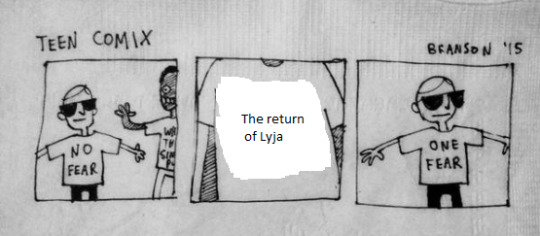
And I’m sorry anon, but I’m going to use this answer to finally write my updated meta on this subject of Lyja, the Skrull Johnny unknowingly married while she was in the guise of Alicia Masters, tackling the nature of the retcon, some really bad writing, and the truly baffling reaction to this from future comics only doubling down on the creep factor. Warnings for discussions of rape.
But Traincat, you might say, didn’t you talk about this for like six hours on Stormcast? Yes, I would answer, that unfortunately just led to more thoughts on the subject, as I had to reread the issues in question.
All 100+ of them.
See, this is actually the storyline that got me to read All of Fantastic Four, where before I had mostly been bouncing around post-Heroes Reborn (everything south of 1998) and the original Lee/Kirby run. And I have problems discussing this storyline, because it makes me uncomfortable in a number of ways. First because I find this storyline, and more importantly the way it eventually played out, deeply uncomfortable, in part because it refuses to ever let itself confront how deeply uncomfortable it is. It’s always pulling back from the edge in way that seems hollow and more than a little victim blame-y. Second, because of my own personal paranoia issues, this is like, my literal nightmare scenario, although I think that’s the least important aspect of my discomfort with it. It’s very unlikely I’ll accidentally marry an alien spy, but trust me I’m on the lookout for the regular variety.
Third, because of the misogyny that is frequent in fandom, I’m often uncomfortable criticizing female characters in love interest roles, which was how the character was initially presented to me and how in fact most canon after the fact treats the character, however, I am going to suggest, erroneously they do so. But Lyja isn’t a Karen Page, Mary Jane Watson, or a Gwen Stacy, and my criticisms are not grounded in her perceived worth as a romantic partner for Favorite Male Character. More over, Lyja doesn’t exist out of context of this relationship. Her only appearances center around it. And another important aspect is that I don’t even think you can properly view Lyja as one character, because half of Lyja’s appearances aren’t, strictly, actually Lyja. The character at the time the comics were being written was not intended to be her, and so you enter a weird stretch of canon where I, at least, because of the way I read comics, have to simultaneously examine it two ways: pre-retcon and post-retcon.
A retcon is, by definition, a piece of new information that imposes a different interpretation on previously described events, typically used to facilitate a dramatic plot shift or account for an inconsistency. In this case the retcon was used for the former, and actually, I think it works quite well for its purposes. It’s just that it tells one story and then refuses to commit to it.
But to backtrack. I’d been vaguely aware of Lyja for a while before I decided to sit down and read this from the beginning, mostly through fandom osmosis and the Marvel wiki. She was always presented to me as an actual love interest who, if they had a particularly melodramatic plot, at least also had a real relationship with Johnny. This, I’m going to argue, is not the case, not in the least because when discussing this you actually have to discuss three completely different relationships: the originally intended Alicia-as-Alicia and Johnny, the retconned Lyja-pretending-to-be-Alicia and Johnny, and Lyja-as-Lyja and Johnny.
But to start at the very beginning, Johnny and Alicia, who would later be retconned into Lyja, began a romance during John Byrne’s run on Fantastic Four, following Ben’s decision to stay in space after the initial Secret Wars. It’s a time of emotional upheaval within the team: Ben’s left the team, replaced by She-Hulk, and Sue’s just suffered a miscarriage.
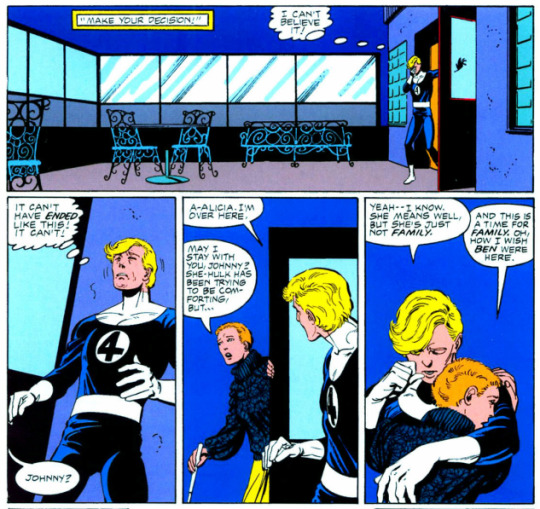
Here, in Fantastic Four #267, Johnny and Alicia embrace in the hospital. Like I said above, there’s two ways to look at every Johnny/Alicia scene before the retcon: with the intent with it was originally written, and how the retcon reframes it. The original scene is lovely, actually – Johnny and Alicia, two of the closest people to Ben and Sue, embracing in the hospital and leaning on each other in their grief.
With the retcon, it becomes something very different. This is canonically Lyja’s first one-on-one contact with Johnny. Her mission is in shambles – Alicia was specifically picked, it would be revealed after the retcon, to be replaced under the belief that an agent masquerading as one of the Four would be discovered, but a Skrull disguised as Alicia, one of the closest people to the Four, might be able to slip detection. But if Ben isn’t part of the team, the role of his girlfriend becomes less valuable. She won’t be able to get as close to the Fantastic Four as her mission requires unless Lyja manages to ingratiate herself some other way. Reed and Sue are a married couple who just suffered the loss of their child – they’re too complicated. She-Hulk’s also a newcomer, so cozying up to her as a confidante doesn’t provide much security. Johnny’s the obvious target – and he’s vulnerable. He’s missing Ben and grieving for his lost niece. What starts as a bittersweet scene of two friends comforting each other becomes, with the retcon, a moment where Johnny’s grief and emotional vulnerability is used against him.
Cut for length.
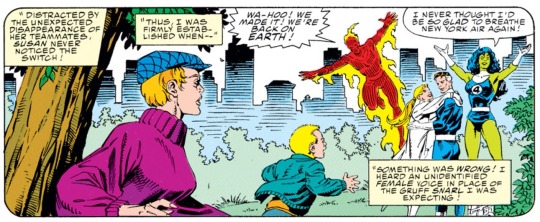
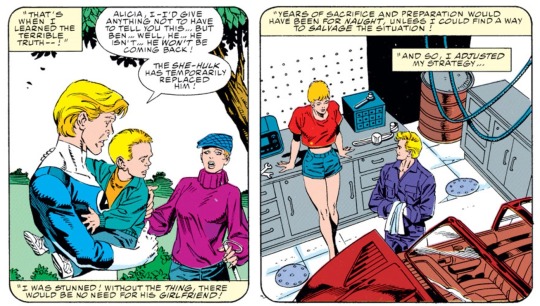
(Fantastic Four #358, the issue immediately after the Lyja reveal.)
Maybe the thing about this retcon and the subsequent handling of it that bothers me is that it actually really works. If you look at it with the retcon in place, it doesn’t feel out of place even though I’m sure it was hastily cobbled together – there’s only one issue’s worth of build up to tip the reader off that something’s wrong before the “Alicia” Johnny married is revealed to be a Skrull. But if you’re going to pull a twist as dramatic as this, you need to commit to it, and address how dark this is, and how every aspect of Johnny’s life was violated for the sake of Lyja’s mission – and, later, violated all over again because Lyja wanted to continue the relationship, heedless of Johnny’s wishes.
In Fantastic Four #275, we’re shown the aftermath of Johnny and Alicia’s first time together:
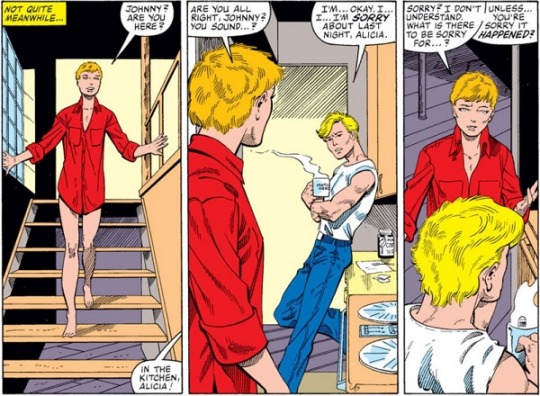
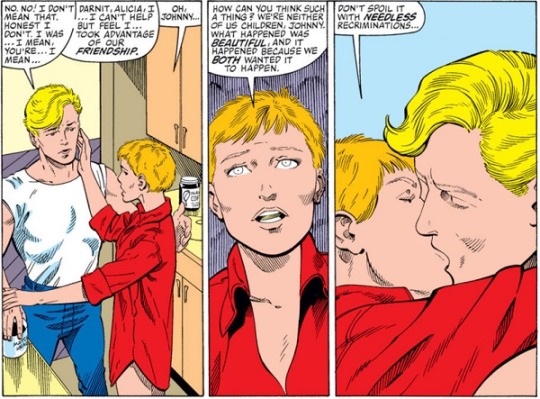
This is, for the record, more or less the closest thing there is in canon to a Johnny Storm sex scene, which is odd for a character who’s often categorized first and foremost as a womanizer: a morning after scene where he does, in fact, seem regretful, or at the very least uncomfortable. It’s interesting to think about that aspect with the retcon in place. Is Johnny uncomfortable because he feels on some level that something is off? It’s a strange scene with or without the retcon (John Byrne both wrote and drew this stretch of Fantastic Four, so you can’t blame a writer-artist disconnect). Without the retcon, it certainly seems like he’s trying to back out of the relationship, but Alicia isn’t on the same wavelength, and with it, “we’re neither of us children” is a very manipulative line from Lyja. She knows from a previous discussion before they got together that Johnny’s youth is something he’s self-conscious about, that he doesn’t really feel “adult.” (Alicia, for the record, is at least a few years older than Johnny. Byrne identifies her as having met the Fantastic Four when she was 19, but then Byrne also retconned a large gap in between Reed and Sue, and introduced Ben’s famed Aunt Petunia as a woman much younger than her husband.)

Johnny/Alicia, pre-retcon, is a strange relationship. There’s a lot of big romantic talk, but very little chemistry between the characters, and I have to confess: I think this was always about Ben, and the betrayal Ben feels when he comes back to Earth and finds that Alicia, his on-again, off-again one true love, and Johnny, the closest thing he has to a younger brother, have gotten together.
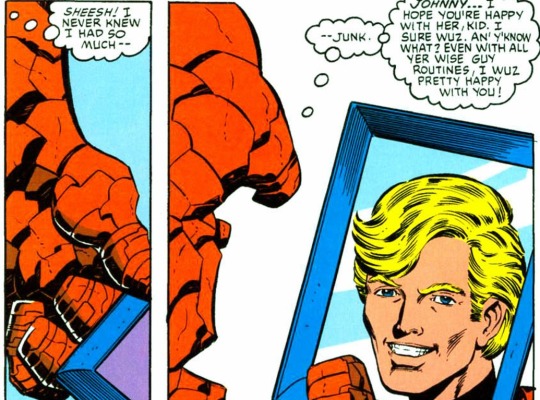
There is this panel where Johnny talks about how in love he is, and how he’s never felt this way before…
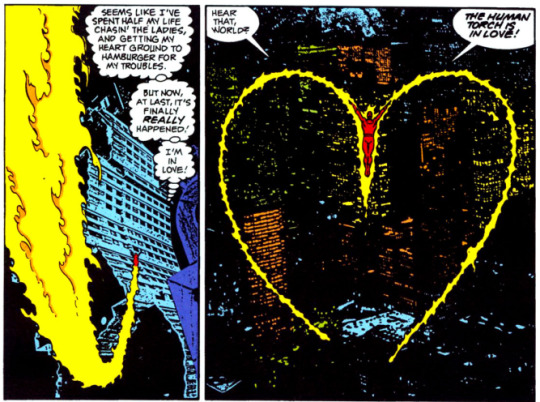
… but it’s hard to take it seriously as something special when this is not unusual for him at the beginning of a relationship, flame-heart and everything:
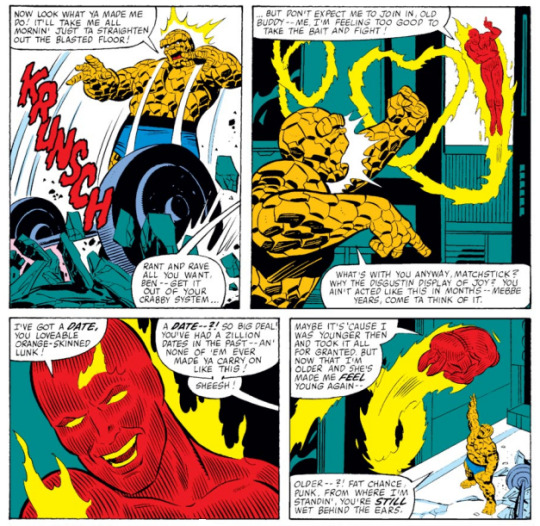
I once went looking for what John Byrne thought of the retcon without much luck, but I did turn up an interview where he said that, while the characters hadn’t told him where they were going yet, he didn’t think he would have married Johnny and Alicia when he left the book with Fantastic Four #294, which is curious when there’s a scene where Johnny seems about to propose before he’s interrupted by Fantastic Four business.
That being said, the timing of Byrne’s departure didn’t leave much choice but to get Johnny and Alicia married – there were only six issues until Fantastic Four #300, and any time there’s a hundred issue mark, you want a big story like a wedding. And the marriage is where things get tricky, both, I think, from a storytelling perspective and from a common problem with larger canons and fandom osmosis. If you say two characters were married, it implies certain things: that they were in love, at least. The problem being that Johnny and Alicia never had real chemistry, not like Ben and Alicia do and not like Johnny and Ben do. Because, as I’ve said – this was always kind of about Ben.
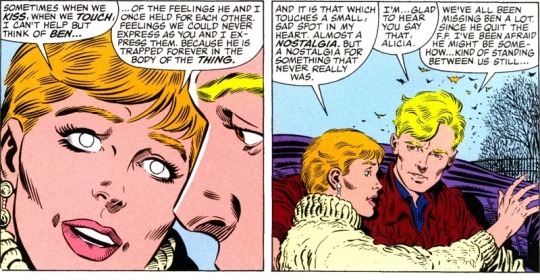
Alicia: Sometimes, when we touch, I can’t help but think of Ben.Johnny: Oh thank God it’s not just me.
Whenever a post-retcon comic tries to treat Johnny and Lyja’s relationship as a normal comic book romance, they usually use the marriage in defense of that, calling Lyja Johnny’s estranged wife, but leaving aside the fact that Johnny didn’t know who he was actually marrying, that implies that the marriage was happy and stable. Which it wasn’t.
From almost the very beginning, there were problems. Shortly after the wedding, Reed and Sue decide to leave the team and the superhero lifestyle so they can better focus on raising Franklin. Ben, the new leader of the team, is tasked with finding their replacements. His first pick is Sharon “Ms. Marvel” Ventura, another plotline I could scream for one hundred years about for a badly handled rape subplot, and his second is Crystal, Johnny’s first real love. Crystal is at this time recently separated from Quicksilver, who she’d left Johnny for, and Ben partially does this with the intention of putting strain on Johnny and Alicia’s marriage.
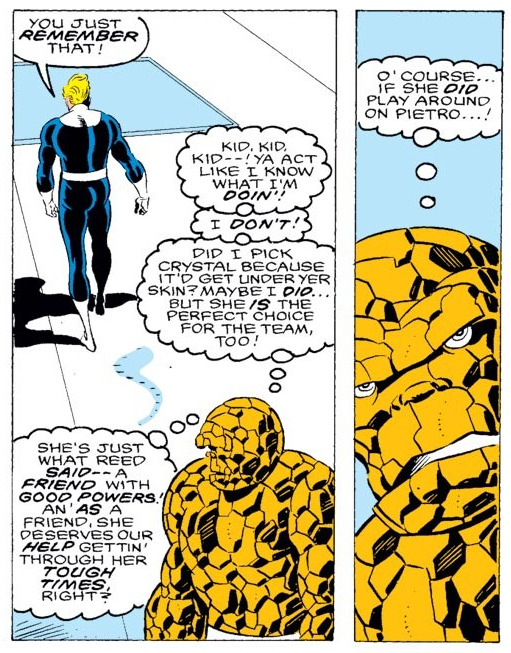
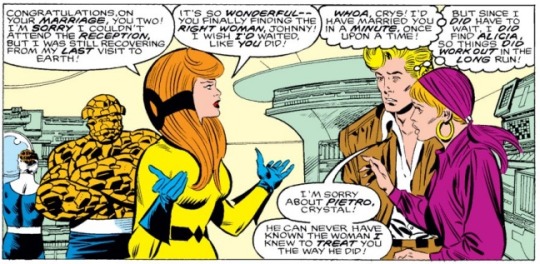
This is five issues after the wedding. Johnny and Alicia only returned from their honeymoon an issue before. If you have to keep the fictional romantic relationship you’re writing interesting by introducing a new love triangle just five issues after the wedding, then you’ve got a problem with the relationship you’re writing.
The thing is, Ben’s scheme almost works – from the start, Crystal’s presence shakes Johnny up and makes him doubt his relationship with Alicia. If you did a shot for every time he thinks, in anguish, “I love my wife” like he’s trying to convince himself, you’d get pretty drunk. But Johnny’s always been depicted as pretty intensely monogamous – cheating isn’t something he does, despite the character’s in-and-out of universe reputation. So he and Crystal just pine dramatically at each other until she leaves the team.
There’s a lot to unpack in the newlywed issues – not in the least the fact that, despite their married status, we never see Johnny and Alicia in bed together, not even in a non-sexual context. If you compare them to Peter Parker and Mary Jane Watson, who were also married in 1987, the difference is shocking:
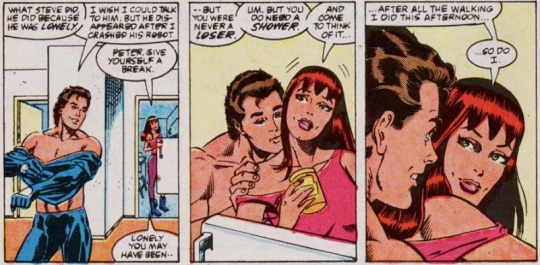
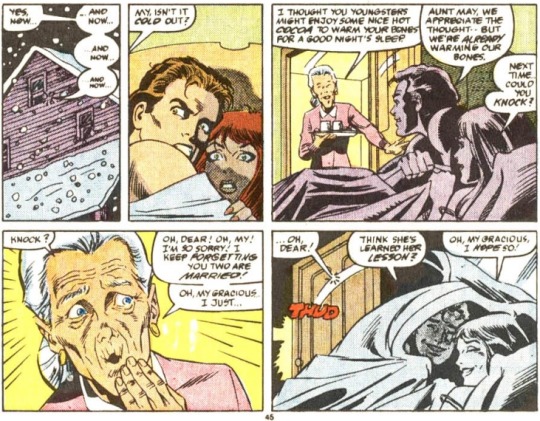

The comics leave no doubt that the Parkers were sleeping together, but Johnny and Alicia? The only real evidence on page they’re having sex is that when Lyja initially lies about the baby, Johnny certainly seems to think it’s possible. Again I note the lack of chemistry between Johnny and Alicia in the early days. They’re almost laughably unsexy, especially for a pair of newlyweds, moving into their own apartment only to move back to the Baxter Building (and back with Johnny’s family) almost immediately. There’s a real lacking sense of intimacy between them, coupled with Johnny’s emotional affair with Crystal. Then there’s the entirety of Fantastic Four #332 where, while captured by rogue Watcher and held unconscious, Johnny dreams of his perfect world, wherein – and I’m not joking about any of this – he dreams that Franklin unintentionally used his reality warping powers to make Alicia love Johnny instead of Ben, ultimately undoing the changes and reuniting Ben and Alicia.
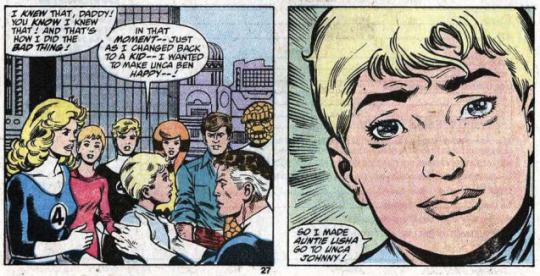
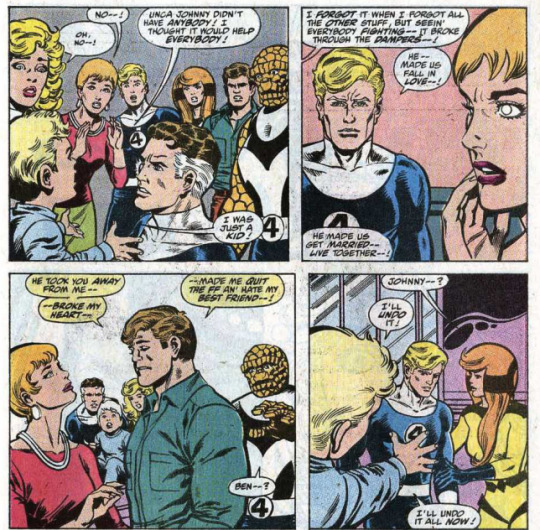
“He – made us fall in love–!” “He made us get married – live together –!”
With or without the retcon in place, Johnny’s obviously unhappy in his marriage. It’s interesting to think of this issue as him subconsciously recognizing that he’s being manipulated, but unable to pinpoint the source of that manipulation. He knows he’s been forced into the marriage, but he doesn’t know how. But this issue makes it very clear that at least subconsciously, he feels forced.
If the marriage had been working in the story, they never would have pulled the retcon and revealed Johnny was married to a Skrull impostor. But it wasn’t, and there’s a problem with Johnny and divorce – which is simply that he’s never broken up with anyone before in his life. (Literally, he’s never ended one of his relationships.) If you view his expressing regret in FF #257 as a clumsy attempt at it, then you can see how quickly that got shut down. Johnny is the unhappy party in the relationship, but he would feel like getting a divorce would be a failure – instead he dreams up a scenario where Alicia was never REALLY in love with him at all.
Besides, it’s not DRAMATIC to have them just say the marriage wasn’t working and call it off. It’s a comic book! It’s supposed to be aliens and clones and robots! I actually don’t think the retcon in itself is bad. It’s everything that comes after it.
In Fantastic Four #356, the cracks begin to show. (The reveal of the retcon is very sudden; I’m going to assume that the decision was made as of the writing of this issue.) “Alicia” expresses her doubt at being able to fix a melted sculpture and is unable to recognize her stepfather, the Puppet Master. In #357, Reed invents a machine that would register the specific brainwaves of the inhabitants of the Baxter Building yadda yadda to prevent intruders and “Alicia” reacts with hostility.
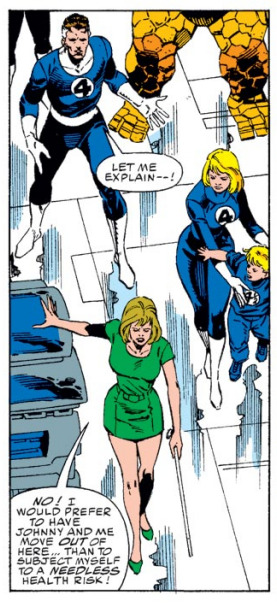
“I would prefer to have Johnny and me move out of here… than to subject myself to a needless health risk!”
This bit has always been very telling to me: with her assumed identity under threat, Lyja threatens to separate Johnny from his family if they don’t comply with her wishes. This would also be why she tells Johnny she has some “news” for him (implying that she’s pregnant) before Ben and the Puppet Master reveal her identity: she can tell him she’s pregnant, then say the Baxter Building is dangerous. New York is dangerous. They should go somewhere else. She’s lived with him for a while now; she knows he doesn’t have any solid support network aside from his family. If he’s cut off from that, he’s essentially isolated, an even easier victim.
(When Lyja says she loves Johnny, I believe the character’s declarations to be genuine. There’s certainly no conflicting statements that say otherwise. And it makes sense that she would love him. Lyja in her own way is a victim – she was selected for the mission because of a failed relationship with her commanding officer. She was told she would be playing the part of Ben’s girlfriend. She was doubtlessly made to expect a monster, since the Skrulls view the Fantastic Four as their enemies – instead she ended up with Johnny, who is warm and kind and sweet. At this point in the story I don’t think she wanted to isolate him specifically to be cruel, just that she saw the end coming and wanted to preserve things as long as possible. But his continued fantasizing about being with other people, coupled with his anguished declarations that he has to honor his vows as a superhero, don’t exactly spell reciprocation of these feelings when you look at them up close, and he was manipulated into this relationship for ulterior motives, and it doesn’t negate that what Lyja attempted to do to preserve her assumed identity was abusive on top of the way she’d already infiltrated his life. Lyja can love Johnny and do terrible things to him, which, intentionally or unintentionally, was what was written.)
Anyway, yadda yadda, Ben and Alicia’s stepfather reveal Lyja’s Skrull status, Lyja says she’s pregnant with Johnny’s baby, the Fantastic Four and Lyja go to space to rescue the real Alicia from where she’s been held in suspended animation by the Skrulls, a battle ensues and Lyja appears to die, confessing with her last breath to Johnny that she’d lied about being pregnant. For the sake of the argument, I will note that Johnny says he loves her as she’s “dying” – but to be fair, he thinks she’s dying, and he’s barely had time to process everything, as evidenced by the fact that when they recover the real Alicia, he still attempts to act like her husband, even knowing he was never married to her. I think it’s fair to say he’s in shock and I don’t think you can take that statement of love as solid proof of his romantic feelings towards Lyja specifically, given all of the other evidence. The Fantastic Four return to Earth with the real Alicia, and publicly announce her sudden divorce from Johnny, since of course she was never involved with him and is in fact still in love with Ben. Alicia is notably traumatized by the swap – Lyja sold her apartment, her works. Alicia canonically feels violated by the incident, and I have got to say, her reactions are some of the few during this period that feel realistic.

“All of my old clothes – everything I’ve ever owned – was tainted by that alien! You can’t imagine the sense of violation I feel!”
Johnny enrolls in ESU and tries to move on with his life. Except this is comics, so, haha, nice try. Lyja, not dead after all, violently attacks Johnny on the ESU campus, attempting to murder him for “abandoning” her and “their baby”, which she now claims is real. In the ensuing battle, Johnny’s forced to go Nova to save his life, and in the process he burns down the ESU campus.
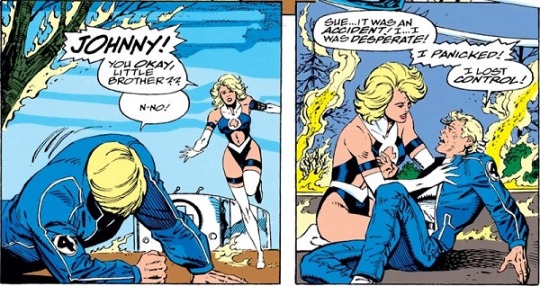
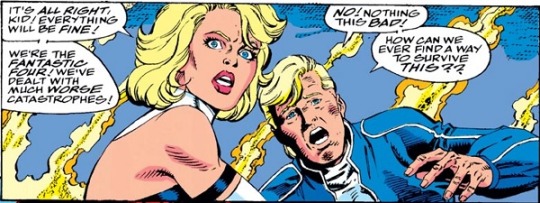
If you’re familiar with Johnny, you know that this is his worst fear realized: his control stripped, his powers doing immense damage. He can’t be sure at this point that he HASN’T burned hundreds of innocents to death. (It is conveniently stated later than, somehow, no one was hurt in the sudden explosion, but that’s always felt very handwave-y.)
When Johnny’s taken into police custody, he sees Lyja in the crowd and panics since after all she did just try to kill him. Afraid for his life – afraid of her – he flames on and escapes police custody, ending up a fugitive for a matter of time. At a certain point, Lyja ends up allied with the Four. Why would they allow this? It’s difficult to say. Because she claims she’s carrying Johnny’s baby. Because Reed is distracted with other matters. Because Sue’s evil Malice persona is starting to reassert itself. Because Ben’s secretly so grateful the real Alicia didn’t actually marry Johnny. Because, frankly, at this point in time: the writing is just not very good.
Okay, like. It’s hard to tell at this point what Lyja honestly believes. She’s been surgically altered without her consent, given laser powers and been implanted with an egg she would, after its removal from her, convince Johnny was their child but was actually a monster designed to kill the Fantastic Four. Honestly, I’m not going to read this part again, and it’s NOT crystal clear within the main Fantastic Four text, but I do believe at one point Lyja may have genuinely believed herself pregnant before the truth was revealed to her, but either way she knew significantly before the hatching and intentionally chose not to tell Johnny in order to be close to him. She definitely knew before she “gave birth”, even going so far as to punish him for being taken aback by the egg.
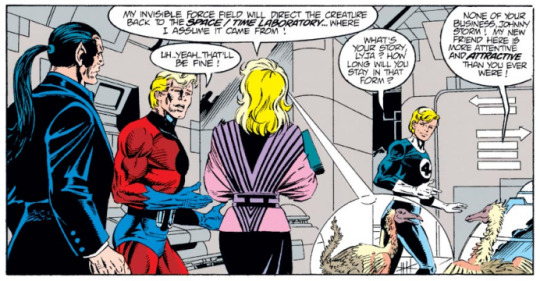
“My new friend here is more attentive and more attractive than you ever were!”
The writing here suffers from two things. First, there’s a lot of showing and not telling. We never SEE Johnny reacting badly to the egg, only thinking wistfully of how it’ll be nice to hold his child when it hatches. Second, I suspect the creative team had very little planned ahead and were making things up as they went along, and that they hadn’t yet decided WHAT was in the egg, hence Lyja’s very vague “I MUST tell him the TRUTH” statements to herself. (She does not tell him the truth.)
It also might explain the truly baffling writing decisions in a Namor comic published during the egg baby period: in it, a shapeshifter disguises herself as Sue to sleep with Namor. When Namor discovers what has happened, he – and everyone else, both the characters and the narrative – are very clear on the fact that Namor was raped by this shapeshifter. All of this happens with Lyja and Johnny standing right there, and the comic doesn’t even seem to realize the problem. Lyja even weeps over the fact that her fake egg baby could have been harmed, which could, of course, be explained at the time that the creative team on Fantastic Four hadn’t decided that the baby was for sure a fake yet.

That being said, the baby WAS confirmed to be a fake, one that Lyja definitely knew about at this point, and everything that came before has to now be viewed with that light. And it’s disturbing to me that neither Johnny’s family nor the book itself ever treats Lyja like his rapist, even when the same situation is applied to a different character. At worst it treats her as obsessed with him, but in a harmless sort of way. But that wasn’t what was written when you actually look at it. She explicitly used the egg – which actually housed a dangerous monster – as an excuse to violate his space, to be close to him when she knew otherwise he wouldn’t want to be around her.
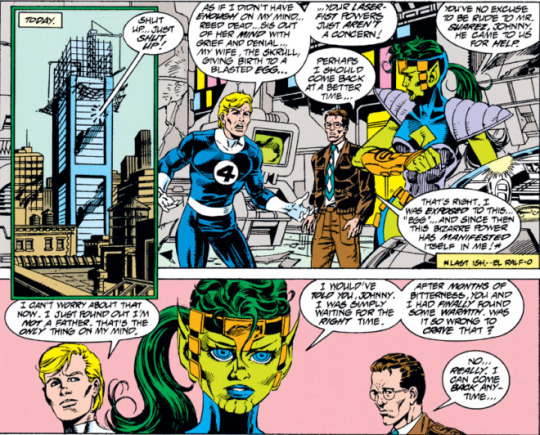
“After months of bitterness, you and I had finally found some warmth. Was it so wrong to crave that?”
In a word? Yes.
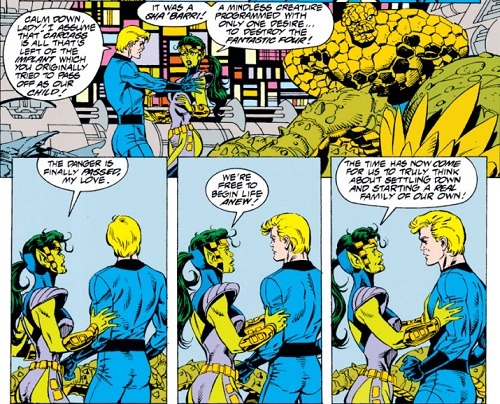

I’ve always liked this scene, as much as I guess I can like any of this stretch of Fantastic Four, in #392, where Johnny finally explodes. “Did you honestly expect we could ever have a life together?”
(This is one of the reasons I find it hard to read comics in the MC2 continuity; I’m trying to have a good time reading about Peter and MJ’s teenage daughter and every once in a while it gets shoved in my face again that, oh yeah, this is the continuity where they decided to have Johnny married to his rapist and stalker.)
But Johnny’s anger towards Lyja – for invading his life, for lying about a baby in order to be close to him not once but twice, for violating every aspect of his life – is treated as almost childish by not only Lyja, but also by Sue, who tells Lyja she’s welcome to stay at the Baxter Building even when Lyja’s lies and her refusal to let Johnny go have chased Johnny from team and from his family in order to get away from her.
But Lyja doesn’t stay at the Baxter Building. Instead, she creates a new identity to follow Johnny, first just around New York:
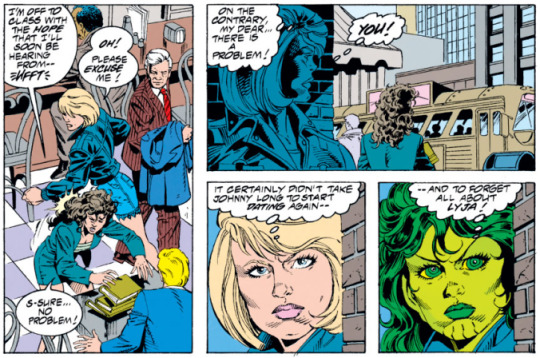
And then out to Oklahoma, where he’s accompanied ESU student’s Bridget O’Neill’s archaeology dig as an excuse to catch up with his friend Wyatt Wingfoot.
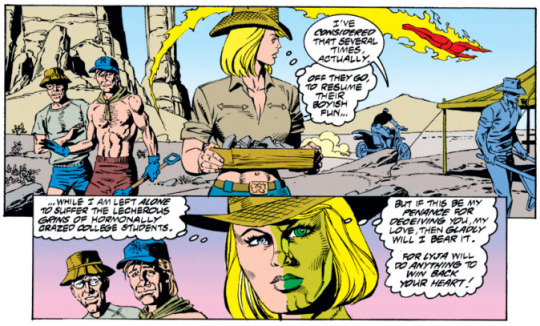
Stalking! Extremely possessive behavior! How romantic! And by “how romantic” I mean yikes. It’s kind of unbelievable to me that anyone wrote this without the narrative explicitly condemning Lyja’s actions – but it doesn’t. If anything, it treats it as quirky. But the idea that someone could attack you, lie to you, attempt to manipulate you – and then turn around and start stalking you, wearing an entirely different face, when you refuse to continue to let them in your life is completely horrifying.
I think part of the reason this might all be so weird is because it was written by men who a) felt uncomfortable that they’d written a male character, especially one like Johnny, whose youth and emotional vulnerability are often played up, as the victim in this narrative and tried, unsuccessfully, to pull away from it instead of following it to any logical conclusion b) can’t really imagine this kind of violence being perpetuated against them as men, or, if they can, find something titillating about the idea of a beautiful woman committing it or c) buy completely into the fantasy of having a hot alien chick obsessed with you, ignoring everything else in favor of that, like this Mark Millar interview seems to imply:
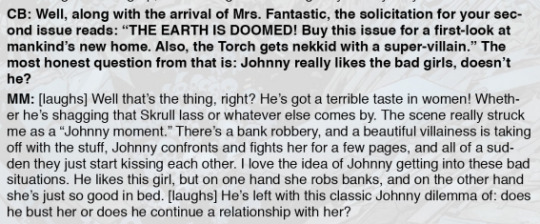
That’s the least Johnny dilemma of all time, by the way, in that it is a description of Peter and Felicia’s early relationship, but moving on.
Lyja, under the subtly-named guise of Laura Greene, proceeds to date Johnny in her new identity, while simultaneously working with the Fantastic Four as herself, and it’s not any less bizarrely written or creepy than the rest of this, not in the least because while several other characters discover Laura Greene’s dual identity, no one tells Johnny. Not Ben. Not Psychic Teen Franklin (long story):
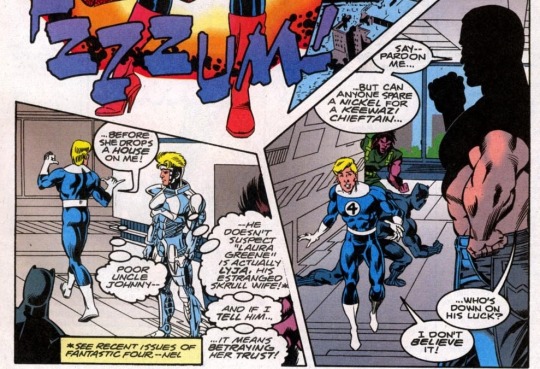
“And if I tell him… it means betraying her trust!”
He’s your uncle, Psychic Teen Franklin, and I’m pretty sure telling him he’s been tricked into unknowingly dating his stalker overrules that, but okay.
Roberta, the Fantastic Four’s robotic receptionist, goes through this twice in both Fantastic Four and Avengers Unplugged:

“I hate having to date Johnny this clandestine manner, but if he knew I was really his shape-shifting ex-wife, he would never see me!”
I am going to scream.
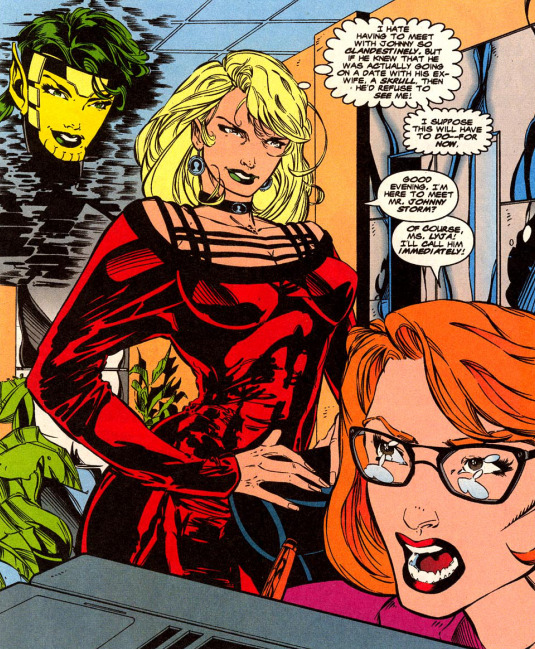
It’s totally cool that Reed built a robot receptionist with sensors delicate enough to catch any impostor who might slip by, but apparently never installed anything like an ethics routine.

“Curse you, Johnny Storm, for making me sneak around this way!!”
That’s right, it’s apparently Johnny’s fault Lyja has taken on an entirely new identity in order to keep herself in his life when he told her in no uncertain terms they had no future together after she took the form of his friend in order to spy on his family, used his grief over the death of his niece to get close to him, married him in that guise without his knowledge of her real identity, attempted to separate him from family, tried to kill him, causing him to burn down a campus in order to save his life, and lied not once but twice about a baby, once when what the “baby” actually was was a monster designed to kill both him and his family. Totally weird how he doesn’t want her in his life. Look, the writing here is atrocious, but that doesn’t stop this from being spectacularly victim blaming behavior.
Another weird thing about this period is how, while Johnny and “Laura” are dating, she doesn’t really seem to like him, at least not how he is, criticizing his attempts to compliment her:
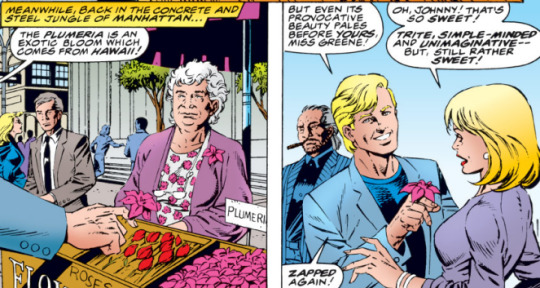
“Trite, simple-minded and unimaginative – but, still, rather sweet!”
And, bizarrely, almost emulating her life as “Alicia”, dismissing his suggestion of a movie as “pedestrian” and instead suggesting they go to a sculpture gallery, where Johnny is clearly uncomfortable:
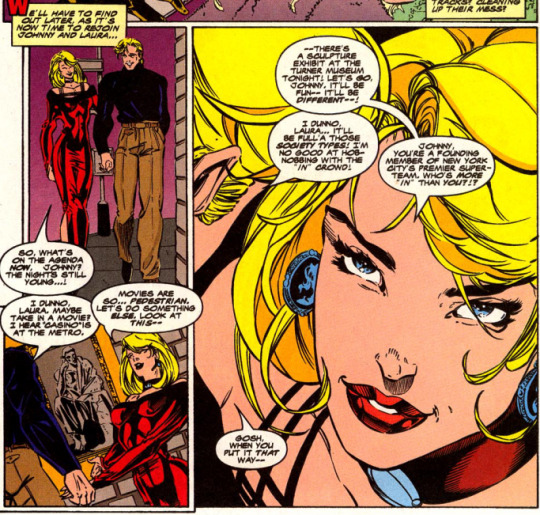
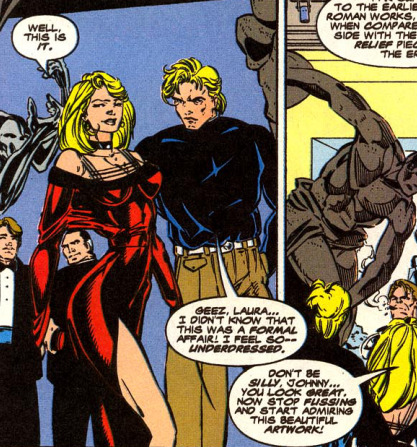
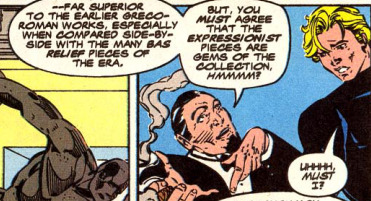
Not that this period of comics seemed particularly concerned with realistic emotional reactions, but being in a sculpture gallery would have to dredge up unpleasant feelings for Johnny. Nevertheless, Lyja pushes for it, even when he expresses his discomfort.
tl;dr, because we’re getting to the end of this, eventually Johnny discovers Laura is Lyja. It’s wrapped up very quickly, because there’s a world-threatening crisis going on. To sum it up, the Fantastic Four and the Avengers would after this be trapped for a period of time in a pocket universe created by Franklin Richards. Lyja was not trapped with them, as they were essentially living out a reboot of their early days. When they returned to the main universe, Johnny remarks briefly on Lyja’s disappearance, but she wasn’t heard from again until the Secret Invasion event in 2008, more than ten years after her last appearance. (Secret Invasion fittingly involved a Skrull invasion force having been secretly planted on Earth for years.)
During Secret Invasion Lyja, in the guise of Sue, launches the Baxter Building (housing, at the time, Johnny, Ben, and the children) into the Negative Zone. When confronted by Johnny, who believed her to be Sue at the moment, she attempted to convince him that Ben had been replaced by a Skrull.
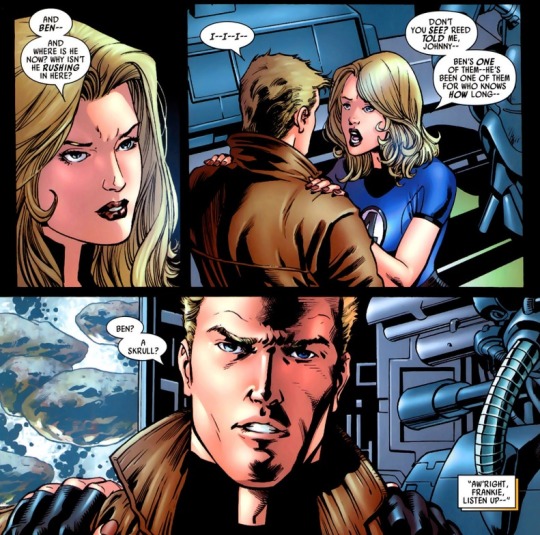
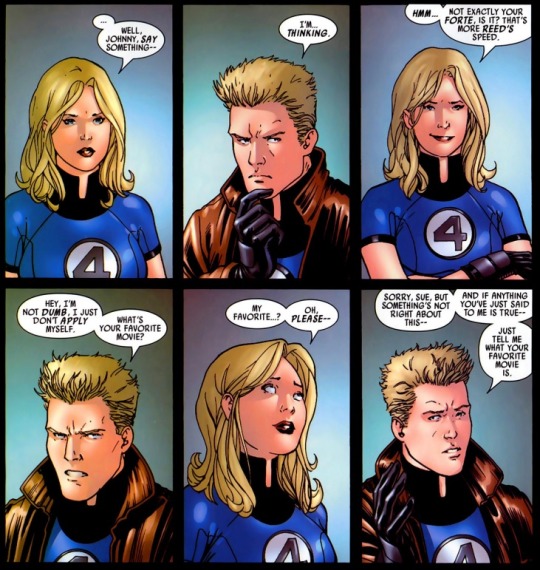
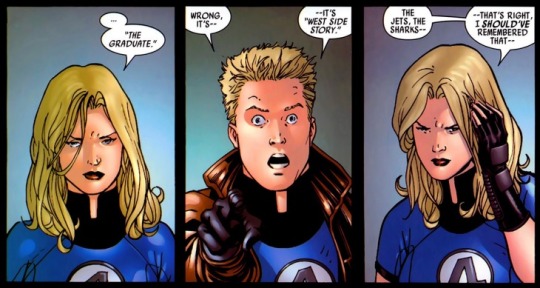
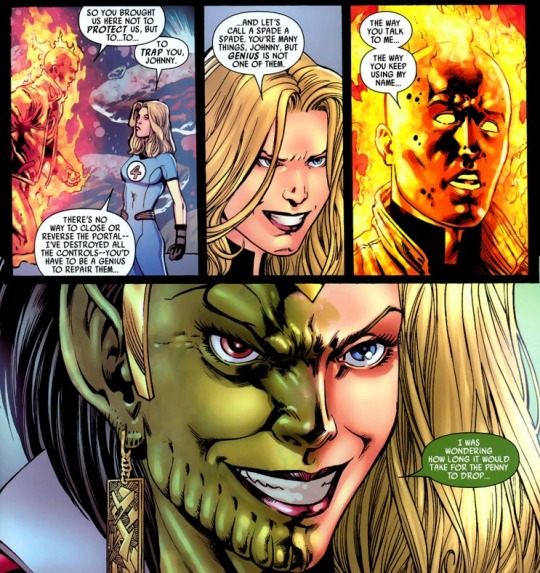
Okay, in the interests of ending this incredibly long post: what happens next is that they fight a Negative Zone inhabitant who attacks them, they kiss, it’s weird, Lyja blames Johnny for never contacting her, saying he could’ve looked up Laura Greene in the phone book, Johnny remains rightfully mad at Lyja, but is reluctant to leave her in the Negative Zone at the end.
The problem is still this initial scene. Lyja later says she took Johnny to the Negative Zone to protect him, as she’d been ordered by the Skrulls to kill him. But if that’s true – why try initially to trick him into believing she was Sue? Why try to convince him that Ben was a Skrull? What was she planning on doing if he’d bought it? Was the goal to take Ben out of the picture – again, to remove his support network and leave him alone with her? And the two comments on his intelligence – “[Thinking]’s not exactly your forte” and “You’re many things, Johnny, but genius is not one of them.” Part of my problem with Lyja is that ever since she made her initial return after her apparent death, there’s always been an edge of cruelty to her interactions with Johnny. She belittles him even as she repeatedly invades his life, essentially telling him he’s not good enough and also that he can’t escape. It’s an uncomfortable read on a lot of levels.
Lyja ultimately stays in the Negative Zone to find herself. It’s not a bad exit for the character, because the character does need to find herself beyond this incredibly toxic dynamic – if I could be sure it was the exit. I know Robinson had planned to bring her back had his run not been cancelled, and given how she’s addressed – by Johnny telling Ben he doesn’t think he’s ever been in love the way Ben and Alicia are, but that “his Alicia” is the closest he’s ever gotten – makes me doubt that all of the abuse was going to be, you know, actually addressed. (It also again frames Johnny’s marriage to “Alicia” as a happy one, and not one fraught with doubt and a deep, if never fully explored, desire on Johnny’s part to have it dissolved.)
Having written all of this, I do have to say I really doubt it’s Lyja and do think the “mystery woman” in question is probably a new character. It’s just 1) I live in fear and 2) Lyja was referenced at the beginning of Two-in-One #2, though likely just because as I’ve noted on other posts discussing Ben and Johnny’s recent separation, the beginning of the Johnny/”Alicia” relationship is the only other significant serious fight between Ben and Johnny.
tl;dr your local Traincat talks herself into a crisis over one line, then talks herself out of it while writing incredibly long reply anon probably wasn’t asking for. Lyja and Johnny’s relationship is not a romance and I would really like to stop seeing it framed as such and, instead of the weird revisionist history that seems to pop up regarding the character, I’d like for comics to admit that Johnny is the victim in this situation rather than doubling down on the “oh! The Human Torch! That playboy!” myth. Thanks for coming to my TED talk.
140 notes
·
View notes
Text
DCOM Rankings #89: Radio Rebel
the reason this review took so long is that I’m engaged now!! Im a fiancé!! So that happened.
Anywayyyyy time to talk about this cringe fest! Now there was a brief tik tok trend like a year ago about this movie and I think it distorted my views on the movie just a little bit but honestly I think it deserved it. There are rumors that Disney plus doesn’t have this movie because it’s ashamed of it. But really it’s just copyright laws, cuz it was made in conjunction with a Canadian company.
BUT I was able to watch the whole thing on YouTube for free so if any of you want to watch it for whatever messed up reason, someone recorded it on their tv in its entirety in 39 parts. Not good quality at all but they put the subtitles on and there’s no background noise so it was an easy watch (in that aspect...).
So where do I even start with this movie? I honestly thought frienemies was the cringiest thing I’ve ever seen...oh boy. I was way wrong. Well actually, let me correct myself, this movie is both cringey AND sends bad messaging!
I’m trying to think if there’s anything good about this movie I can say before I completely obiterate it...hmmmmm. I will say this! It was way more entertaining than Frienemies. And some of the other C and below movies on my list. It kept my attention and now it’s kind of iconic (in a not so good way but still).
But like the attention wasn’t always good attention. So let’s just dive in to the review and if I find something good I’ll talk about it but this is basically a roast. And I’m here for it!
So...again it’s hard to know where to start but let’s go with the overall story. I LIKE the concept of an alter ego radio host who is actually super shy in real life. I really do think that’s interesting! But the execution of this was really not easy to watch....It’s like a really cringey insane version of hatching Pete. I would prefer hatching Pete over this any day of my life. Even if that movie still wasn’t the best either. If they were less over the top with it and actually got real, with real problems, then maybe I would have liked it.
Okay, the characters. I don’t really like any of them maybe except for Gavin. He was the only sane character in the entire movie. And I think the only person that got the message of the movie (the good message anyway) while his band mates are literally in another world, like shut up you’re in high school!!! It was the most annoying scene when Gavin was like “hey have you seen Tara? She’s supposed to be here for our school assignment” “omg stop thinking about Tara, only think about Stacy, she’s higher class and good for our image”
....
“Ummm yeah I literally just asked you if you’ve seen her because we were partnered up on a school project and we literally present next . School?? Do you remember school?? The place we’re at right now? Where we have homework and books and normal things going on? Do you even care that you’re not in class right now??”
I get that like Gavin calls him out on his bullshit a little bit but I wish he took an extra punch like what I said above. Anyway...
I think I would have liked Tara a lot more if it wasn’t Debbie Ryan playing her. And I do feel bad because she was great in suite life, but she literaly cannot play a shy character, because she’s not a shy person, at least that’s how I perceive her to be based on interviews and such. But besides the acting piece. She goes out and gives all this great advice to folks but never takes it herself. That and, I watched one review that made a really good point, Tara’s messaging is really mixed. Some of it is good, like telling folks to wear red tomorrow as a solidarity thing, that was good! But telling folks to disrupt class and stick it to the man, and get people in trouble, including the school, yikes. Like she was under the threat of expulsion the entire time and it was seen as an unfair thing in the movie, ummm no that was pretty justified if you hired an entire radio station to have a unauthorized dance party in the school parking lot during the day time. I would understand if they threatened expulsion after the “wear red” thing or if something happened off school property, like far off, not just a foot. But yeah I wish her messaging was more consistent with “be who you are” and “get rid of the classist high school system” rather than “stick it to the teachers and principal, they suck and take away your ipods!”
As for the other characters, they’re just kind of annoying, they try to be funny but they’re just cringey and the writers/director are clearly out of touch with how high school kids really act. (I hate the best friend character so much) And the PARENTS! Let’s talk about the parents for a second! Not only does Tara condone disrespecting your teachers in the name of...freedom? but her parents are all for it! Even when Tara was actually worried about getting expelled. Her mom was literally “I don’t careee you’re giving people a voice at the cost of your high school permanent record and college acceptances!” When her dad walks into the studio one day and was like “hey not cool to use the slam name to throw an unauthorized party at your school” “but I’m giving them a voice” “oh okay then carry on!”.
Ok, I GET what the message of the movie was trying to be. Well actually I don’t now that I think about it. But obviously it was all good intentions. Like all the stuff about being your true authentic self but also not being different from your classmates....? Like I really think they needed to stick with one message and stay in that lane, because it gets too confusing that way. But anyway, I GET what they were trying to go for, it just failed miserably. That was the movie’s main problem. It wanted to connect with high school teens on a deeper level and 1. It didn’t know what avenue to take so it took all of them, and 2. It ended up being the least relatable thing on television.
Basically, it’s like everyone is in another dimension where normal people don’t exist. It’s all these crazy wacky over the top characters in a place where no one cares about school. Only social status and fame. Even the parents agree. But oh noooo that mean ol’ principal, who yes was also a mustache twisty villain, took my iPod and now it’s revenge time. Like okay Stacy was the true villain here, she manipulated everybody, including the principal, into doing what she wanted. But no it’s all the principal’s fault because she’s the authority! And you’re made to hate her because she says evil stuff. This movie was just all over the place and didn’t know what to do with itself. So this review is also all over the place because of it.
Maybe it’s because I’ve officially grown out of the new movies. Maybe if I was younger I would have liked this movie a lot more. Maybe I’m biased because I watched a few other reviews before posting this one. I don’t know. But I think this movie has a lot more wrong with it that just being cringey. I now expect most of not all the future DCOMS to be at least a little cringey just because they are being made for a new generation. It’s sad, but at least it will be over soon!
Okay grade time! I honestly don’t know if I want to give this a minus or not. Like I said, this was bad but kind of a hilarious bad. Like it’s still somewhat entertaining but in a bad way. It kept my attention at least. So maybe I’ll stick with a regular C on this one. I feel like I should give it a D but I don’t know....I feel weird because the movie obviously had a big ish budget for a DCOM I feel like, so the movie LOOKS fine. Agghhhh. But yeah if I’m struggling to find one or two good things about this movie, maybe I should put it at a D level. Hmmm would I rather watch this or den brother....? Definitely this! So wherever it goes, it’s going above that for sure.
Sighhh ranking these is going to be harder than I thought...but it is what it is! I have no idea what the next movie is, I didn’t check the list, so it will be a surprise! See ya then! Hope I post this review in a somewhat timely manner...
0 notes
Text
Kevin Spacey's 'Let Me Be Frank': Is This Madness Or Is There A Deeper Meaning?
As many of us already know, given it has now garnered 9.4 million views on Youtube, former House of Cards star Kevin Spacey posted a cryptic video on Christmas Eve. The video was published immediately following the announcement that he will face a charge of felony sexual assault in Massachusetts on accusations that he groped a young man in 2016.
The allegations were first brought forward in November 2017, when former Boston TV anchor Heather Unruh told reporters that Spacey groped her teenage son in a crowded bar inside a Nantucket restaurant. Since the charge was announced, the 59-year-old Oscar-winning actor has argued that he should be excused from attending his Jan. 7 arraignment at the Nantucket District Court because his presence would “amplify the negative publicity already generated in connection with this case.” However, Judge Thomas Barrett denied Spacey's request. For the record, Spacey has said he will plead not guilty to felony indecent assault and battery.
'Let Me Be Frank'
Back to the video, titled 'Let Me Be Frank,' which is an ironic double-entendre between him offering to speak honestly (frankly) while in the character of Frank Underwood (his role as a ruthless and dishonest politician in House of Cards). And even a third meaning pops out from this title, where the plea to 'Let me be Frank' is a request to return to House of Cards as Frank Underwood, a role that was stripped away from him when the sexual assault allegations first surfaced.
With the multi-level meaning of this title as an indicator, I believe Kevin Spacey thought about and worked on the words and the delivery of this video for a very long time, carefully working a single narrative to move in and out of different levels, speaking to different audiences at different times, and sometimes several audiences at once. Rather than believing that there was one ultimate purpose for releasing this video, I sense that Spacey was dealing with a host of internal emotions and desires that he wanted to express, and felt the need to give birth to this idea that he may have become obsessed with.
As an actor, few would deny that Spacey was one of the best in Hollywood, and I believe he used those talents to create a mysterious narrative that would have a host of pundits weighing in with different theories. I am not saying this video is genius and will be studied by academia and media studies for years to come; however, I do think that it seems to be the result of a lot of thought and effort, and may even be clearly understood by his target audience. He probably had said the whole monologue hundreds of times over and over again before shooting it. There is a sense that he had a lot to say here. Whether or not it accomplished what he intended is a different matter, but I think it is worth a deeper investigation than what I've seen on social media and mainstream media. Let's look at some of the different 'takes' people have had on it and see if the real 'message' can be found by analyzing them, regardless of your personal opinions of Kevin Spacey.
youtube
Take One: Comeback Attempt
This first take is what I would consider the most literal interpretation of the video, in which the very title 'Let Me Be Frank' may be a plea to his fans to do what they can to lobby Netflix for Spacey's character on House of Cards, Frank Underwood, to literally come back from the dead. Indeed, the way the video starts, with Spacey facing directly into the camera, he seems to be talking to fans, much in the same way his character Frank Underwood sometimes talks directly to the audience:
I know what you want. Oh sure they may have tried to separate us but what we have is too strong – is too powerful. I mean after all we shared everything, you and I. I told you my deepest darkest secrets. I showed you exactly what people are capable of.
Here, Spacey discusses his role as Frank Underwood and elevates it to the level of an extremely important disclosure of the true means and motives of the elite, of the people who have power in the world. Of course, one could say that about the show House of Cards in general, as it does indeed reveal the shadowy forces behind politics. But acting as the main character, not only with his lofty acting skills but also his firsthand knowledge of this dark world (more on that later), Spacey may really believe that he was doing a great service to humanity, bringing occult knowledge out of the darkness and into the public domain.
Perhaps there is something in that, but he may have given himself over to self-aggrandizement. After all, he's not the only one on this mission. This form of disclosure is now seeping out from all realms of human activity. His characterization of the desire on the part of fans to have him return to continue revealing the dark side is a bit over the top:
So we're not done no matter what anyone says and besides, I know what you want. You want me back.
There may be some emotional entanglement between his character being killed off and his personal experience of being shunned by the allegations of sexual misconduct, to the extent that he questions the legitimacy of the death of Frank Underwood in the same vein as the legitimacy of the claims against him, so that the restoration of Frank Underwood somehow equates to the restoration of his innocence:
Anyway all this presumption made for such an unsatisfying ending, and to think, it could have been such a memorable send-off.
His Brother Weighs In
In an episode of Inside Edition on the very subject of 'Let Me Be Frank' (see video clip below), we see that this 'comeback attempt' is exactly the take of Spacey's younger brother, Randy Fowler:
Fowler: The man has no shame. He's begging for his job. This video was a rationalization to try and convince his fan base to convince Netflix to bring it back. He thinks that he's gonna make a comeback.
Interviewer: You think he shouldn't have done it.
Fowler: Of course he shouldn't have done it, but it's 'Act 3' of a desperate man. He got dethroned overnight, It's over.
youtube
Kevin Spacey's brother wrote a book in 2017 titled 'A Moment In Time: Living In The Shadows,' which details the sexual and physical abuse Randy endured from his father, whom Randy refers to as 'The Creature,' as well as his mother's denial and indifference to his pain and her almost erotic favoritism toward Kevin. Going more deeply into this is not possible here, but it will serve us to know that Randy believes Kevin to be a man who has suppressed all emotions from their devastating childhood, and as a result of never coming to grips with his childhood, is probably capable of extreme brutality and sexual deviance like their father was. In the book,
Randy discusses in detail his practically non-existent relationship with his estranged younger brother, Kevin Spacey Fowler, whom Randy tried so hard to protect during their abusive childhoods. Randy asks the following questions: “Why is one brother brutally honest and the other dishonestly brutal? Why does one have character and the other plays characters? Why was one a plaything for their cruel, mentally ill, perverted pedophile father and the other embraced by a loving mother, who ignored Randy's screams of pain and suffering?”
Take Two: A Denial Of Guilt To Victims
When we combine Randy's testimony with the number of accusations of sexual misconduct and sexual abuse that have surfaced against Spacey over a number of years, as well as Spacey's prominence in the industry, it's presumable that Kevin Spacey has been deeply involved in Hollywood pedophilia for a number of years.
Is it possible that Spacey's main aim for putting out the video was as a kind of offence against those that claim Spacey abused them, like the felony sexual assault charge in Massachusetts, as evidenced by the video in this Independent article? If so, that puts these words in a completely different context:
I know what you want. Oh sure they may have tried to separate us but what we have is too strong – is too powerful. I mean, after all, we shared everything, you and I. I told you my deepest darkest secrets.
And you trusted me even though you knew you shouldn't. So we're not done no matter what anyone says and besides, I know what you want. You want me back.
Oh well, of course they're gonna say I'm being disrespectful not playing by the rules like I ever played by anyone's rules before. I never did and you loved it.
The suggestion that, even in his own mind, Spacey believes that his victims were actually willing participants who made the choice to trust him and therefore have no right to accuse him of wrongdoing, is just too gruesome to even contemplate - especially since he is known to have been a guest on Jeffrey Epstein's Island, as evidenced in the 'Lolita Express' flight log below and detailed in this Infowars article.

In truth, I do not think that the main purpose of this video is to speak to any of his past victims and try to justify his actions or absolve himself of what he did to those young boys. But it does seem like, in Spacey's mind, there is a connection between his relationship with his audience, in which he deeply reveals/confesses his character's desires and motives (and his own, in many ways), and his relationship with his victims, in which Spacey may imagine that he is making himself vulnerable to them and revealing his 'deepest, darkest secrets.'
I have no idea what is going on in Spacey's mind, but it is not inconceivable that, coming from the highly dysfunctional home life that he did, he might feel he is not to blame and in some twisted way is giving his victims something they wanted.
Take Three: A Warning To The Illuminati
For me, a more cogent reason for creating this video was to make a hidden threat to those above him in his elite 'Illuminati' pedophile circle who may have allowed allegations of sexual misconduct against him to be taken seriously by law enforcement and the mainstream media. The impression I hold from my research is that those who follow the rules and do what their higher-ups tell them to do are able to escape most or all crimes with impunity.
In a sense, Kevin Spacey may have done something to displease his masters to make them turn his world of high status, fame, wealth, and capacity into a world of being shunned, dismissed, hated, and even incarcerated. Spacey's bitterness may very well be best explained by the engraving in the Royal Windsor cup he drinks from in the video, which reads 'Throughout all my life and with all my heart I shall strive to be worthy of your trust.'
My feeling is that Kevin Spacey enjoyed moving up the ranks of the Illuminati, and even surprised some of his higher-ups by his audacity and insubordination, perhaps to the extent that they were entertained and even enlightened by his participation in their activities. One of the 'rules' that must be followed by the Illuminati in accordance with their spiritual principles, as David Wilcock elaborates on in the video clip below, is that they must 'make known' all they do in the world in order to get humanity's tacit 'consent' to their actions and their rule. But these public revealings are often cloaked in symbols, popular culture, comedy and drama, and other metaphorical forms.
youtube
Indeed, House of Cards could stand as one of the most prominent forms of revealing Illuminati means and tactics in the film industry, and perhaps the 'game' is to see how far they can go in revealing who they truly are and what they truly do without knocking down their 'house of cards' entirely. Perhaps Kevin Spacey liked to push the envelope in this regard.
Oh well of course they're gonna say I'm being disrespectful not playing by the rules like I ever played by anyone's rules before. I never did and you loved it.
Certainly this scene from the show, in which Frank Underwood is not only participating in a ceremony at Bohemian Grove but is also explaining what his purpose as a high-ranking American politician is for being there, pushes the envelope:
youtube
Perhaps Spacey was threatening to go even further, and was empowered by the fact that he was actually rewarded for his past insubordination. Perhaps there was a dispute about what season 6 would actually reveal. These are all suppositions, of course, but this message seems to fit best with some of the more powerful phrases from the video:
I mean, if you and I have learned nothing else these past years, it's that in life and art nothing should be off the table. We weren't afraid, not of what we said, not of what we did, and we're still not afraid because I can promise you this. If I didn't pay the price for the things we both know I did do, I'm certainly not gonna pay the price for the things I didn't do.
If Kevin Spacey is guilty of unspeakable crimes, that would render the acts he is currently being accused of as 'insignificant' in the eyes of the Illuminati. The more serious acts were likely committed within the protected bowels of the Illuminati, and would not surface because they would implicate other members and may endanger the Illuminati itself. When they turn on one of their own, the tactic of the Illuminati tends to be to support accusations that are outside of ritualistic Illuminati practices. Hence, this is perhaps why Spacey acknowledges that he and other members don't pay for the true crimes that are part of Illuminati ritual and that he's 'not gonna pay the price for things I didn't do.'
But does Spacey's threat that he's 'not gonna pay the price' mean he's threatening to tell all and bring down others if the higher-ups don't use their power and influence to free him rather than convict him in court? Perhaps this line gives us the answer:
And my confidence grows each day that soon enough you will know the full truth.
The Takeaway
As interesting as it may be to speculate on what Kevin Spacey's true intent was with this video, his actions were unjustifiable, and no video could argue against that. However, I believe this video also reflects the significant power the Illuminati holds. Gone are the days when the Illuminati ruled over a public that was oblivious to the fact that they were being subjected to a slow process of mind control and subjugation. Today, thanks to the Internet, camera phones, and growing public knowledge, the Illuminati is in a precarious position in which they're no longer capable of completely controlling the narrative and are in danger of being brought out of the shadows. If disgruntled members like Kevin Spacey have their way, that may happen sooner rather than later.
0 notes
Text
Kevin Spacey's 'Let Me Be Frank': Is This Madness Or Is There A Deeper Meaning?
As many of us already know, given it has now garnered 9.4 million views on Youtube, former House of Cards star Kevin Spacey posted a cryptic video on Christmas Eve. The video was published immediately following the announcement that he will face a charge of felony sexual assault in Massachusetts on accusations that he groped a young man in 2016.
The allegations were first brought forward in November 2017, when former Boston TV anchor Heather Unruh told reporters that Spacey groped her teenage son in a crowded bar inside a Nantucket restaurant. Since the charge was announced, the 59-year-old Oscar-winning actor has argued that he should be excused from attending his Jan. 7 arraignment at the Nantucket District Court because his presence would “amplify the negative publicity already generated in connection with this case.” However, Judge Thomas Barrett denied Spacey's request. For the record, Spacey has said he will plead not guilty to felony indecent assault and battery.
'Let Me Be Frank'
Back to the video, titled 'Let Me Be Frank,' which is an ironic double-entendre between him offering to speak honestly (frankly) while in the character of Frank Underwood (his role as a ruthless and dishonest politician in House of Cards). And even a third meaning pops out from this title, where the plea to 'Let me be Frank' is a request to return to House of Cards as Frank Underwood, a role that was stripped away from him when the sexual assault allegations first surfaced.
With the multi-level meaning of this title as an indicator, I believe Kevin Spacey thought about and worked on the words and the delivery of this video for a very long time, carefully working a single narrative to move in and out of different levels, speaking to different audiences at different times, and sometimes several audiences at once. Rather than believing that there was one ultimate purpose for releasing this video, I sense that Spacey was dealing with a host of internal emotions and desires that he wanted to express, and felt the need to give birth to this idea that he may have become obsessed with.
As an actor, few would deny that Spacey was one of the best in Hollywood, and I believe he used those talents to create a mysterious narrative that would have a host of pundits weighing in with different theories. I am not saying this video is genius and will be studied by academia and media studies for years to come; however, I do think that it seems to be the result of a lot of thought and effort, and may even be clearly understood by his target audience. He probably had said the whole monologue hundreds of times over and over again before shooting it. There is a sense that he had a lot to say here. Whether or not it accomplished what he intended is a different matter, but I think it is worth a deeper investigation than what I've seen on social media and mainstream media. Let's look at some of the different 'takes' people have had on it and see if the real 'message' can be found by analyzing them, regardless of your personal opinions of Kevin Spacey.
youtube
Take One: Comeback Attempt
This first take is what I would consider the most literal interpretation of the video, in which the very title 'Let Me Be Frank' may be a plea to his fans to do what they can to lobby Netflix for Spacey's character on House of Cards, Frank Underwood, to literally come back from the dead. Indeed, the way the video starts, with Spacey facing directly into the camera, he seems to be talking to fans, much in the same way his character Frank Underwood sometimes talks directly to the audience:
I know what you want. Oh sure they may have tried to separate us but what we have is too strong – is too powerful. I mean after all we shared everything, you and I. I told you my deepest darkest secrets. I showed you exactly what people are capable of.
Here, Spacey discusses his role as Frank Underwood and elevates it to the level of an extremely important disclosure of the true means and motives of the elite, of the people who have power in the world. Of course, one could say that about the show House of Cards in general, as it does indeed reveal the shadowy forces behind politics. But acting as the main character, not only with his lofty acting skills but also his firsthand knowledge of this dark world (more on that later), Spacey may really believe that he was doing a great service to humanity, bringing occult knowledge out of the darkness and into the public domain.
Perhaps there is something in that, but he may have given himself over to self-aggrandizement. After all, he's not the only one on this mission. This form of disclosure is now seeping out from all realms of human activity. His characterization of the desire on the part of fans to have him return to continue revealing the dark side is a bit over the top:
So we're not done no matter what anyone says and besides, I know what you want. You want me back.
There may be some emotional entanglement between his character being killed off and his personal experience of being shunned by the allegations of sexual misconduct, to the extent that he questions the legitimacy of the death of Frank Underwood in the same vein as the legitimacy of the claims against him, so that the restoration of Frank Underwood somehow equates to the restoration of his innocence:
Anyway all this presumption made for such an unsatisfying ending, and to think, it could have been such a memorable send-off.
His Brother Weighs In
In an episode of Inside Edition on the very subject of 'Let Me Be Frank' (see video clip below), we see that this 'comeback attempt' is exactly the take of Spacey's younger brother, Randy Fowler:
Fowler: The man has no shame. He's begging for his job. This video was a rationalization to try and convince his fan base to convince Netflix to bring it back. He thinks that he's gonna make a comeback.
Interviewer: You think he shouldn't have done it.
Fowler: Of course he shouldn't have done it, but it's 'Act 3' of a desperate man. He got dethroned overnight, It's over.
youtube
Kevin Spacey's brother wrote a book in 2017 titled 'A Moment In Time: Living In The Shadows,' which details the sexual and physical abuse Randy endured from his father, whom Randy refers to as 'The Creature,' as well as his mother's denial and indifference to his pain and her almost erotic favoritism toward Kevin. Going more deeply into this is not possible here, but it will serve us to know that Randy believes Kevin to be a man who has suppressed all emotions from their devastating childhood, and as a result of never coming to grips with his childhood, is probably capable of extreme brutality and sexual deviance like their father was. In the book,
Randy discusses in detail his practically non-existent relationship with his estranged younger brother, Kevin Spacey Fowler, whom Randy tried so hard to protect during their abusive childhoods. Randy asks the following questions: “Why is one brother brutally honest and the other dishonestly brutal? Why does one have character and the other plays characters? Why was one a plaything for their cruel, mentally ill, perverted pedophile father and the other embraced by a loving mother, who ignored Randy's screams of pain and suffering?”
Take Two: A Denial Of Guilt To Victims
When we combine Randy's testimony with the number of accusations of sexual misconduct and sexual abuse that have surfaced against Spacey over a number of years, as well as Spacey's prominence in the industry, it's presumable that Kevin Spacey has been deeply involved in Hollywood pedophilia for a number of years.
Is it possible that Spacey's main aim for putting out the video was as a kind of offence against those that claim Spacey abused them, like the felony sexual assault charge in Massachusetts, as evidenced by the video in this Independent article? If so, that puts these words in a completely different context:
I know what you want. Oh sure they may have tried to separate us but what we have is too strong – is too powerful. I mean, after all, we shared everything, you and I. I told you my deepest darkest secrets.
And you trusted me even though you knew you shouldn't. So we're not done no matter what anyone says and besides, I know what you want. You want me back.
Oh well, of course they're gonna say I'm being disrespectful not playing by the rules like I ever played by anyone's rules before. I never did and you loved it.
The suggestion that, even in his own mind, Spacey believes that his victims were actually willing participants who made the choice to trust him and therefore have no right to accuse him of wrongdoing, is just too gruesome to even contemplate - especially since he is known to have been a guest on Jeffrey Epstein's Island, as evidenced in the 'Lolita Express' flight log below and detailed in this Infowars article.

In truth, I do not think that the main purpose of this video is to speak to any of his past victims and try to justify his actions or absolve himself of what he did to those young boys. But it does seem like, in Spacey's mind, there is a connection between his relationship with his audience, in which he deeply reveals/confesses his character's desires and motives (and his own, in many ways), and his relationship with his victims, in which Spacey may imagine that he is making himself vulnerable to them and revealing his 'deepest, darkest secrets.'
I have no idea what is going on in Spacey's mind, but it is not inconceivable that, coming from the highly dysfunctional home life that he did, he might feel he is not to blame and in some twisted way is giving his victims something they wanted.
Take Three: A Warning To The Illuminati
For me, a more cogent reason for creating this video was to make a hidden threat to those above him in his elite 'Illuminati' pedophile circle who may have allowed allegations of sexual misconduct against him to be taken seriously by law enforcement and the mainstream media. The impression I hold from my research is that those who follow the rules and do what their higher-ups tell them to do are able to escape most or all crimes with impunity.
In a sense, Kevin Spacey may have done something to displease his masters to make them turn his world of high status, fame, wealth, and capacity into a world of being shunned, dismissed, hated, and even incarcerated. Spacey's bitterness may very well be best explained by the engraving in the Royal Windsor cup he drinks from in the video, which reads 'Throughout all my life and with all my heart I shall strive to be worthy of your trust.'
My feeling is that Kevin Spacey enjoyed moving up the ranks of the Illuminati, and even surprised some of his higher-ups by his audacity and insubordination, perhaps to the extent that they were entertained and even enlightened by his participation in their activities. One of the 'rules' that must be followed by the Illuminati in accordance with their spiritual principles, as David Wilcock elaborates on in the video clip below, is that they must 'make known' all they do in the world in order to get humanity's tacit 'consent' to their actions and their rule. But these public revealings are often cloaked in symbols, popular culture, comedy and drama, and other metaphorical forms.
youtube
Indeed, House of Cards could stand as one of the most prominent forms of revealing Illuminati means and tactics in the film industry, and perhaps the 'game' is to see how far they can go in revealing who they truly are and what they truly do without knocking down their 'house of cards' entirely. Perhaps Kevin Spacey liked to push the envelope in this regard.
Oh well of course they're gonna say I'm being disrespectful not playing by the rules like I ever played by anyone's rules before. I never did and you loved it.
Certainly this scene from the show, in which Frank Underwood is not only participating in a ceremony at Bohemian Grove but is also explaining what his purpose as a high-ranking American politician is for being there, pushes the envelope:
youtube
Perhaps Spacey was threatening to go even further, and was empowered by the fact that he was actually rewarded for his past insubordination. Perhaps there was a dispute about what season 6 would actually reveal. These are all suppositions, of course, but this message seems to fit best with some of the more powerful phrases from the video:
I mean, if you and I have learned nothing else these past years, it's that in life and art nothing should be off the table. We weren't afraid, not of what we said, not of what we did, and we're still not afraid because I can promise you this. If I didn't pay the price for the things we both know I did do, I'm certainly not gonna pay the price for the things I didn't do.
If Kevin Spacey is guilty of unspeakable crimes, that would render the acts he is currently being accused of as 'insignificant' in the eyes of the Illuminati. The more serious acts were likely committed within the protected bowels of the Illuminati, and would not surface because they would implicate other members and may endanger the Illuminati itself. When they turn on one of their own, the tactic of the Illuminati tends to be to support accusations that are outside of ritualistic Illuminati practices. Hence, this is perhaps why Spacey acknowledges that he and other members don't pay for the true crimes that are part of Illuminati ritual and that he's 'not gonna pay the price for things I didn't do.'
But does Spacey's threat that he's 'not gonna pay the price' mean he's threatening to tell all and bring down others if the higher-ups don't use their power and influence to free him rather than convict him in court? Perhaps this line gives us the answer:
And my confidence grows each day that soon enough you will know the full truth.
The Takeaway
As interesting as it may be to speculate on what Kevin Spacey's true intent was with this video, his actions were unjustifiable, and no video could argue against that. However, I believe this video also reflects the significant power the Illuminati holds. Gone are the days when the Illuminati ruled over a public that was oblivious to the fact that they were being subjected to a slow process of mind control and subjugation. Today, thanks to the Internet, camera phones, and growing public knowledge, the Illuminati is in a precarious position in which they're no longer capable of completely controlling the narrative and are in danger of being brought out of the shadows. If disgruntled members like Kevin Spacey have their way, that may happen sooner rather than later.
0 notes